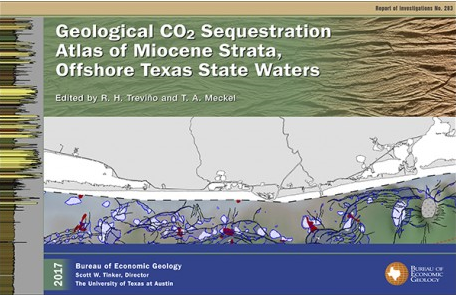News 2019
December 13, 2019: Three members of the Baker Hughes (BHGE) market intelligence group presented at the weekly Bureau of Economic Geology seminar, followed by a meeting with GCCC staff and the UT Energy Institute in our meeting area. The teams explored areas of synergy that could possibly be pursued in order to advance carbon capture and storage technology and implementation.
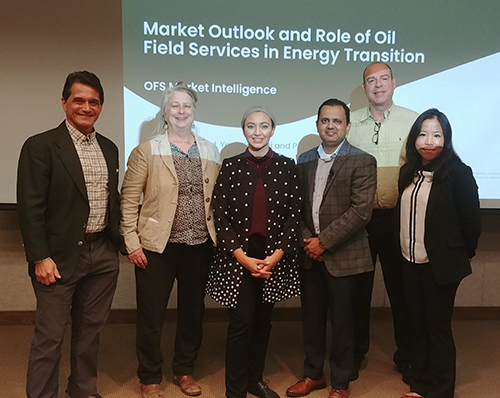
GCCC researchers Ramon Gil-Egui and Susan Hovorka stand next to BHGE market intelligence staff, Azizah Mohmed and Preshit Gawade, and Bureau chief economist Ning Lin. after the Baker Hughes presentation titled, "Market Outlook 2020 and Role of Oil Field Services in Energy Transition."
December 9–13, 2019: GCCC research scientist Seyyed Abolfazl Hosseini hosted the "Understanding Pore-Scale Mechanisms of Fluid Flow in Porous Media: Modeling and Experimental Approaches" session at the AGU Fall Meeting 2019. GCCC senior research scientist Tip Meckel will host "Use of high-resolution 3D marine seismic for overburden monitoring at the Tomakomai CO2 storage project, Hokkaido, Japan" on Wednesday. Find where you'll find the work of Sahar Bakhshian, Hosseini, and Meckel at AGU 2019 on our blog: /blog/gccc-at-agu-fall-2019/

December 4, 2019: At the 25th UNFCCC Climate Change Conference (COP25), GCCC research scientist Katherine Romanak again co-organized, since its inception in 2011, the only official CCS side event at the UN Climate Change Conference—providing crucial input to global delegates. This year’s presentation was titled, “Carbon Removal and Return: Can CCS Decarbonize Industry in South America and Help the Oceans?” Romanak discussed monitoring, safety, and technology transfer, addressing common questions related to each and emphasized that CSS will be crucial for countries to meet their goals to reduce their national determined contributions (NDCs). Other panelists included Tim Dixon (IEAGHG), Carol Turley (Plymouth Marine Laboratory), Jan Wilcox (Worcester Polytechnic), Andrew Jupiter (University of the West Indies), Mike Monea (International CCS Knowledge Centre), Piera Patrizio (International Institute for Applied Systems Analysis), and Keith Whiriskey (Bellona). Topics included: the IPCC Special Report on Oceans and Cryosphere, direct air capture, developing a national program in Trinidad and Tobago, decarbonizing cement, BECCS sustainable jobs, and low-carbon infrastructure. The Carbon Capture and Storage Association (CCSA) also helped support the event.
A recording is available (for a limited time) at: https://bit.ly/2DLVgsa
View a summary of the presentation here: enb.iisd.org/climate/cop25/side-events/4dec.html#event-4
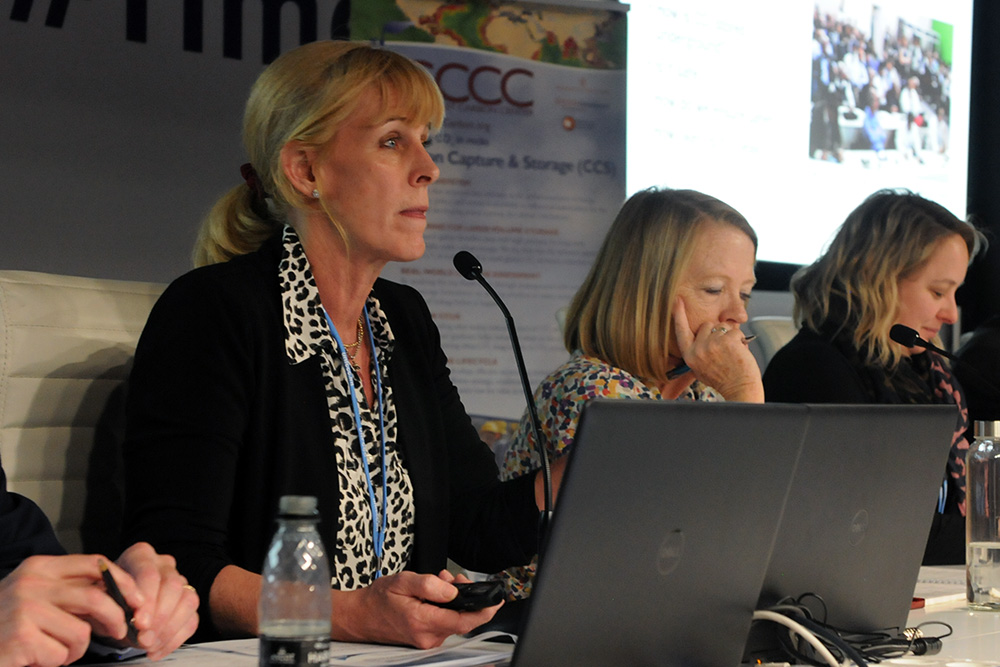
|
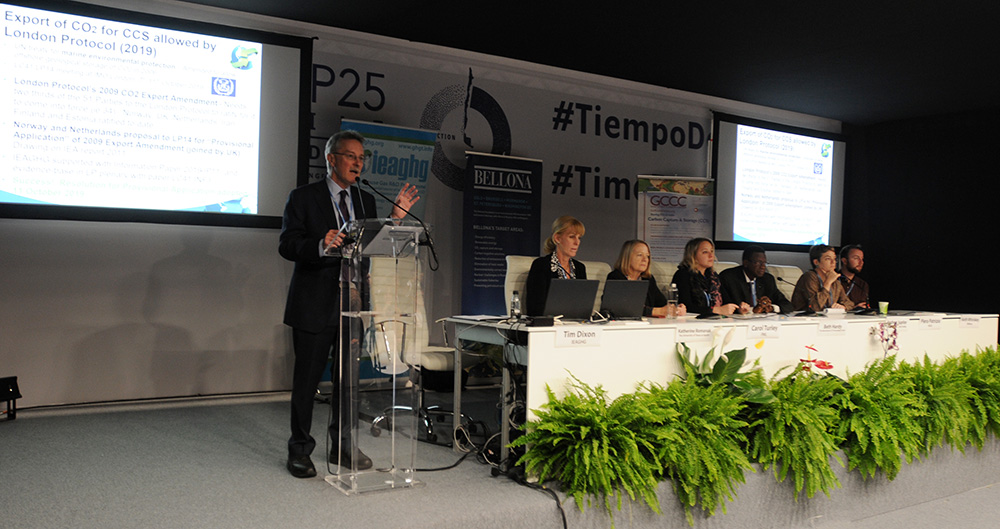
|
November 29, 2019: Tip Meckel and lead author Philip Ringrose published an article that illustrates how CCS on global continental margins can achieve the industrial emissions goals laid out by the IPCC's 2-degree scenario. “There’s been a lot published on emissions reduction strategies and what capacity is needed from each within the coming decades, but we don’t know exactly how each technology will roll out,” Meckel said. “With this paper, we provide an actionable, detailed pathway for CCS to meet the goals laid out in those reports.” The publication, "Maturing global CO2 storage resources on offshore continental margins to achieve 2DS emissions reductions" was published in Nature's Scientific Reports.
Ringrose, P.S., and T.A. Meckel, 2019, Maturing global CO2 storage resources on offshore continental margins to achieve 2DS emissions reductions: Scientific Reports, v. 9, p. 17994, doi.org/10.1038/s41598-019-54363-z.
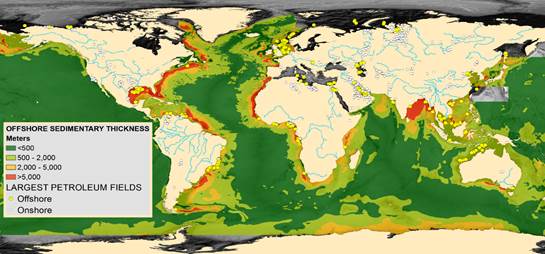
CCS on global continental margins can achieve the industrial emissions goals laid out by the IPCC's 2-degree scenario. Read the paper here.
November 23–26, 2019: GCCC research associate Sahar Bakhshian presented a poster titled "Wettability Impact on Two-Phase Flow Dynamics" at the 72nd Annual Meeting of the APS Division of Fluid Dynamics. GCCC undergraduate researcher Margaret Murakami and research scientist Seyyed Abolfazl Hosseini were co-authors. Read the technical summary or download the poster here.
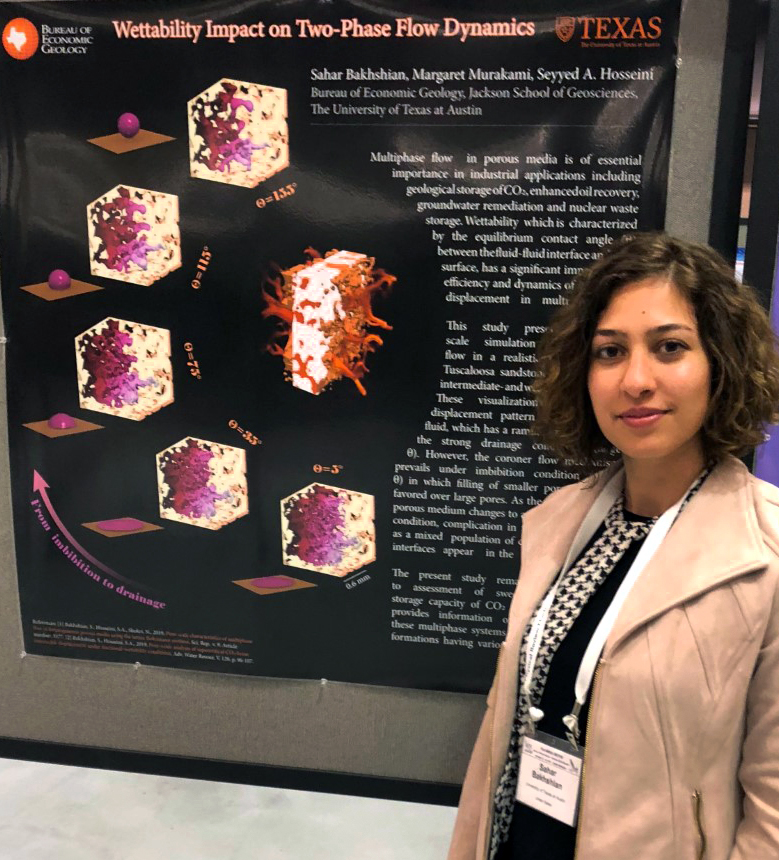
Wettability is characterized by the equilibrium contact angle between the fluid-fluid interface. The study's pore-scale simulation displays the displacement pattern changes as the imaged sandstone moves from strong to weak wet conditions. Read the technical summary or download the poster here.
November 15, 2019: GCCC's newest researcher to come on board, Alex Bump, has nearly two decades of experience in exploration geology at BP with an extensive study of salt diapir geology. Bump gave a talk to the group, including information about salt impacts different sediment geologies and its unique properties that make it an important feature to look for if prospecting storage reservoirs. The meeting gave a unique opportunity for potential collaboration with another research group at the Bureau, the Applied Geodynamics Laboratory (AGL). Together, the two teams assessed the potential of the geology surrounding salt diapirs for carbon dioxide storage.
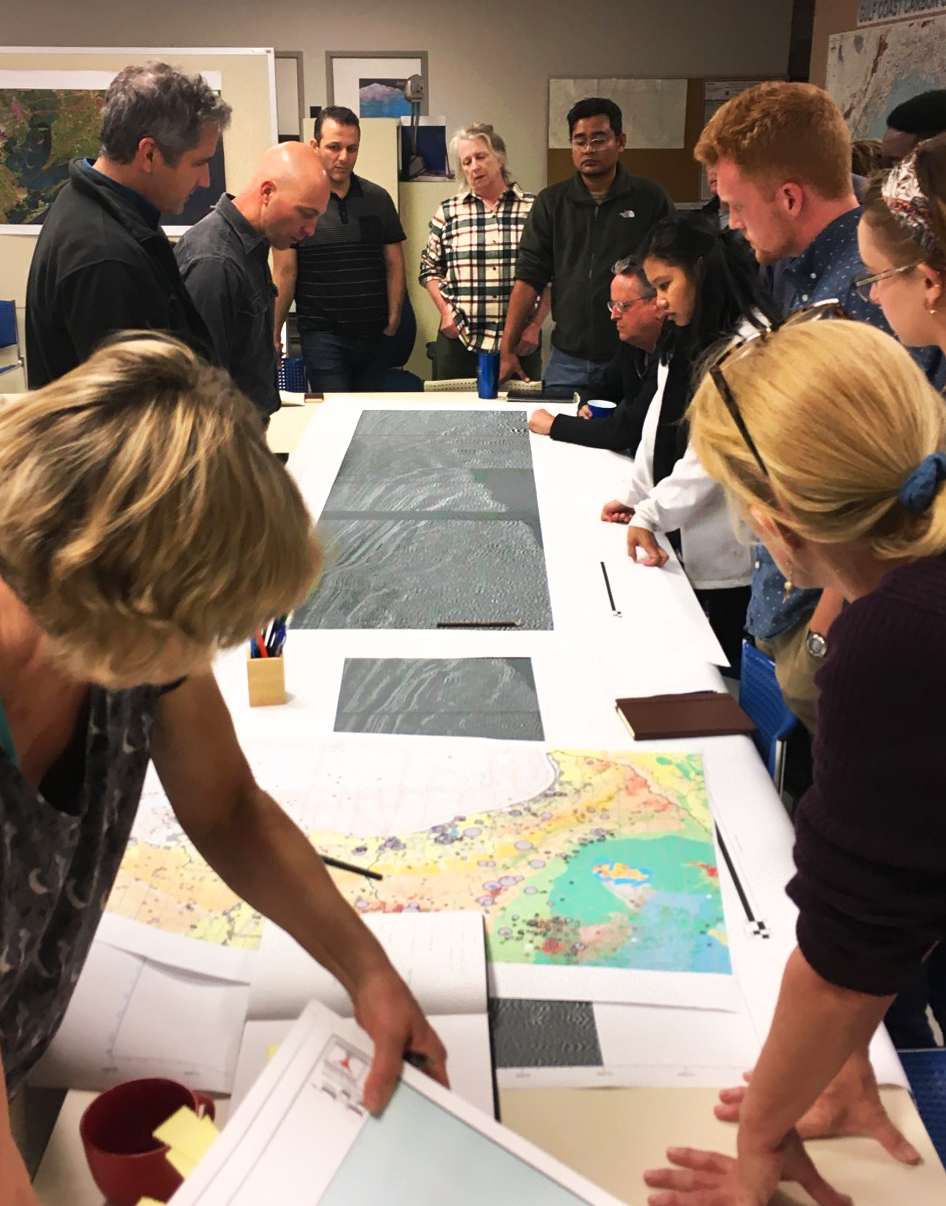
GCCC and the Applied Geodynamics Group gather around to identify salt features on 2D seismic imagery acquired in Texas
November 9, 2019: Visiting guest and GoMCarb project partner Rob Finley traveled to Austin to teach a class to GCCC first-year master's students. Finley has had a long and celebrated career in geology, including decades at the Bureau of Economic Geology and the Illinois State Geological Survey. The class, titled "An Introduction to Some Concepts of Reservoir Heterogeneity," explored how different sedimentary depositional systems affect reservoir quality (and ultimately capacity) for carbon dioxide injection, providing a more nuanced view of reservoir models particularly relevant to GCCC's work in the Texas Gulf Coast Miocene sand intervals commonly targeted for injection.
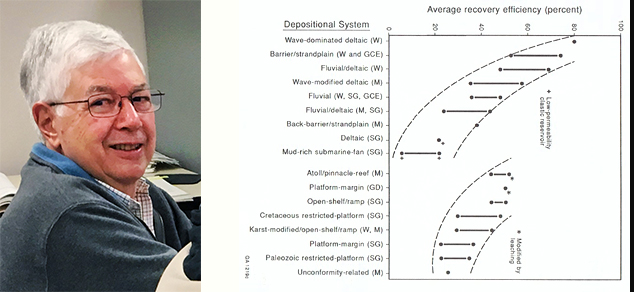
Geologist Rob Finley taught a class to GCCC students on reservoir heterogeneity and how it affects reservoir quality for CO2 injection. This graph (Tyler and Finley, 1991) describes how depositional systems impact the average recovery efficiency in hydrocarbons and can be used as a corollary to carbon dioxide injection.
November 7, 2019: Tip Meckel's paper, "High-resolution 3D seismic acquisition at the Tomakomai CO2 storage project, offshore Hokkaido, Japan", was recently listed on SSRN's Top Ten download list for the Earth Science Research Network: Seismology topic. The SSRN is a research repository and an international journal. The ranking demonstrates the study's value to the broader scientific community. View the full article here.
November 5, 2019: Tip Meckel participated in a panel on Carbon Capture, Utilization, and Storage at the D3 Revival - Energy Disruption Conference in Houston. The discussion was led by John Gibson, the energy technology chairman at Tudor, Pickering, Holt & Co. Other participants included Anthony Cottone, senior director of Low Carbon Ventures at Occidental; Alex Rozenfeld, founder and managing director at Climate Impact Capital; Michael Ryan, vice president of CCUS and OGCI Climate Investments; and Cam Hosie of 8 Rivers Capital. Meckel emphasized the need to act now, with 45Q tax credits presenting the best financial opportunity to develop new projects and add value to existing assets.
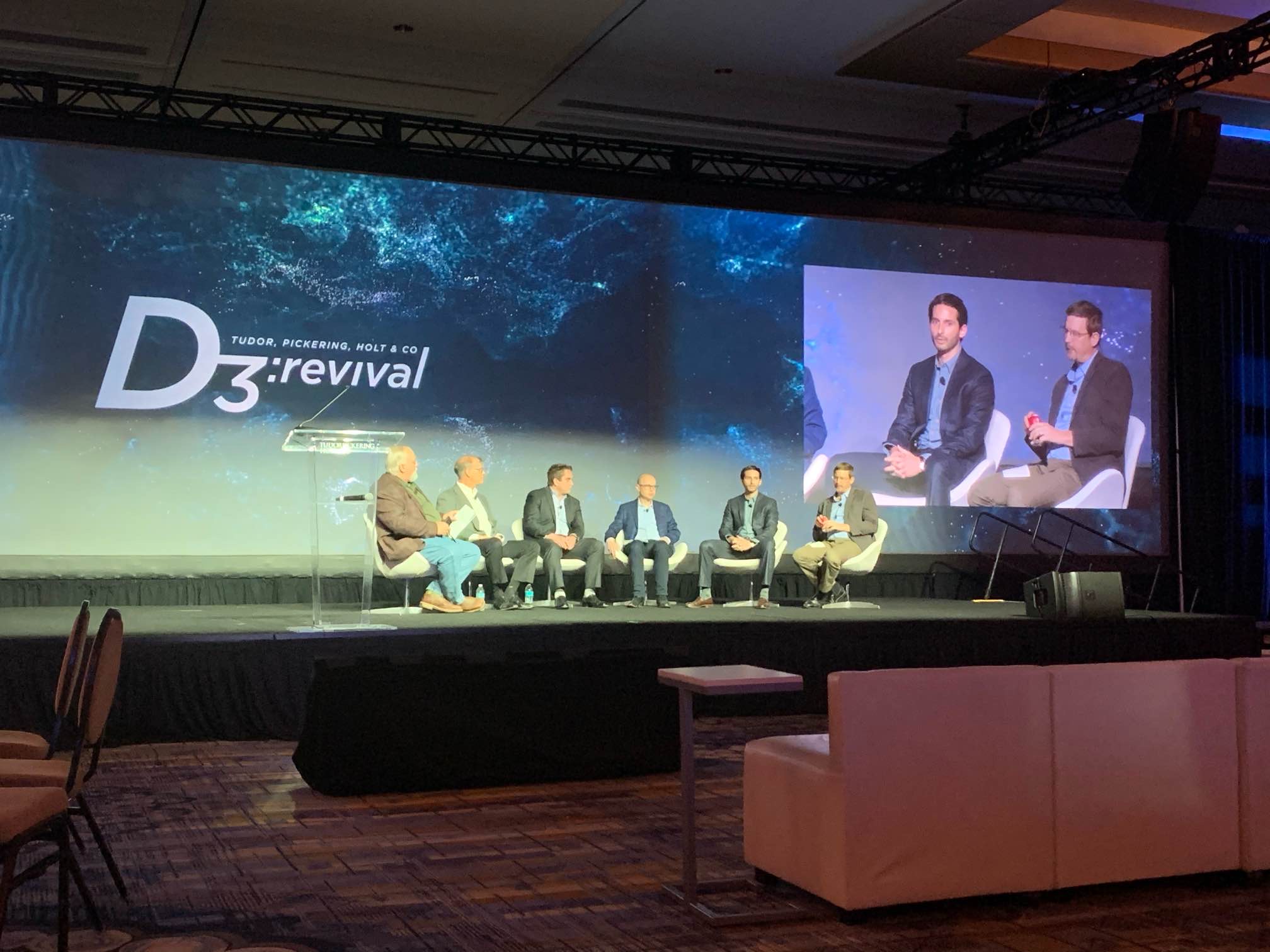
Tip Meckel (right) participated on an energy investment panel, informing investors of the 45Q tax credit's potential. Photo by Moji Karimi.
November 1, 2019: GCCC Ph.D. student Prasanna Krishnamurthy and coauthors Meckel and Dicarlo published an article in Water Resources Research that describes the novel sand tank laboratory developed for visualizing and quantifying fluid migration in engineered clastic heterogeneous materials. It represents the first-its-kind capability and opens up a new direction for methodical exploration of the effects of heterogeneity on fluid migration and resulting saturation. Read the paper here.
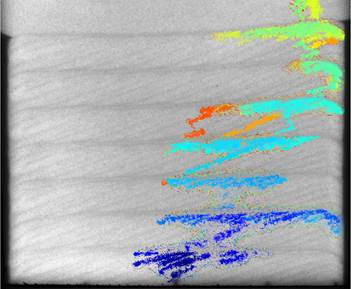
GCCC PhD student Prasanna Krishnamurthy built automated sandpacks that mimic depositional fabric patterns. Injected CO2 is imaged as the buoyancy drives it upwards.
October 29–30, 2019: Katherine Romanak traveled to Trinidad and Tobago to co-host a symposium in Trinidad and Tobago to get the small island nation fast-tracked to climate action. Read about the international event in this blog post, written by Tim Dixon of the IEAGHG. You can also find more about the symposium, Developing a National CCS Program in Trinidad and Tobago: An International Knowledge-Sharing Symposium at: http://www.thecermproject.com/ccs-symposium.html
October 21–25, 2019: Tip Meckel was an invited guest at KAUST University north of Jeddah in western Saudi Arabia. The King Abdullah University of Science and Technology is a relatively new campus with astounding architecture and laboratory facilities. Meckel presented one technical talk on sedimentary heterogeneity and fluid flow and a second general talk to an audience of 100 on the current status of CCS. During his visit, he interacted with the faculty and graduate students of the Ali I. Al-Naimi Petroleum Engineering Research Center (ANPERC) to identify new areas of collaborative research.
Tip Meckel was an invited guest and speaker at KAUST University north of Jeddah in western Saudi Arabia
October 20, 2019: Katherine Romanak is featured in the Norwegian CCS Research Centre's new video. 75% of emissions that need to be reduced will have to come from developing countries according to the IEA. Romanak is working on this in Trinidad and Tobago, a nation with one of the highest per capita emissions in the world.
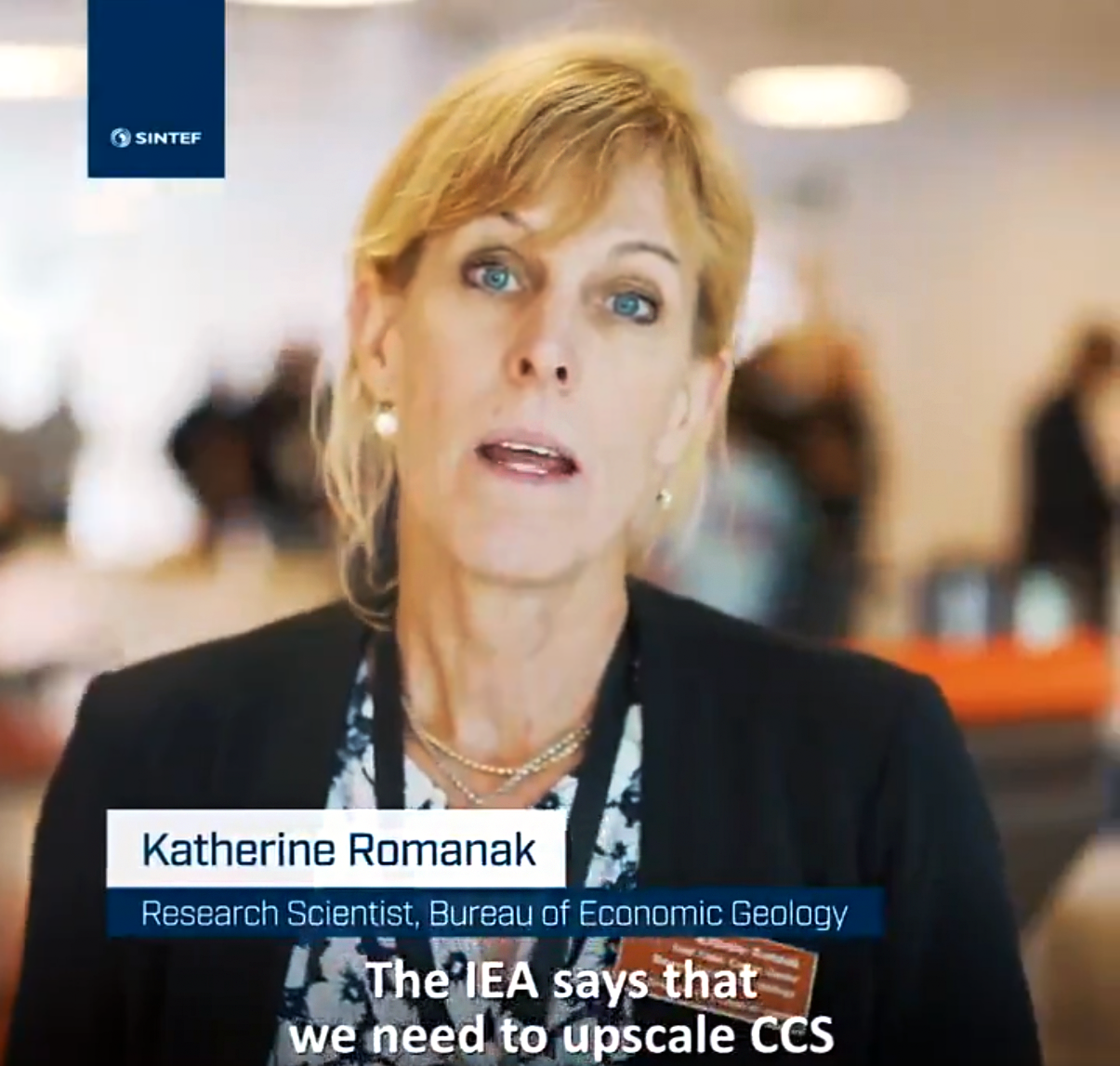
October 18, 2019: Tip Meckel gave a talk at the Bureau of Economic Geology's first 3E Research Symposium 2019 on the latest developments in CCUS.
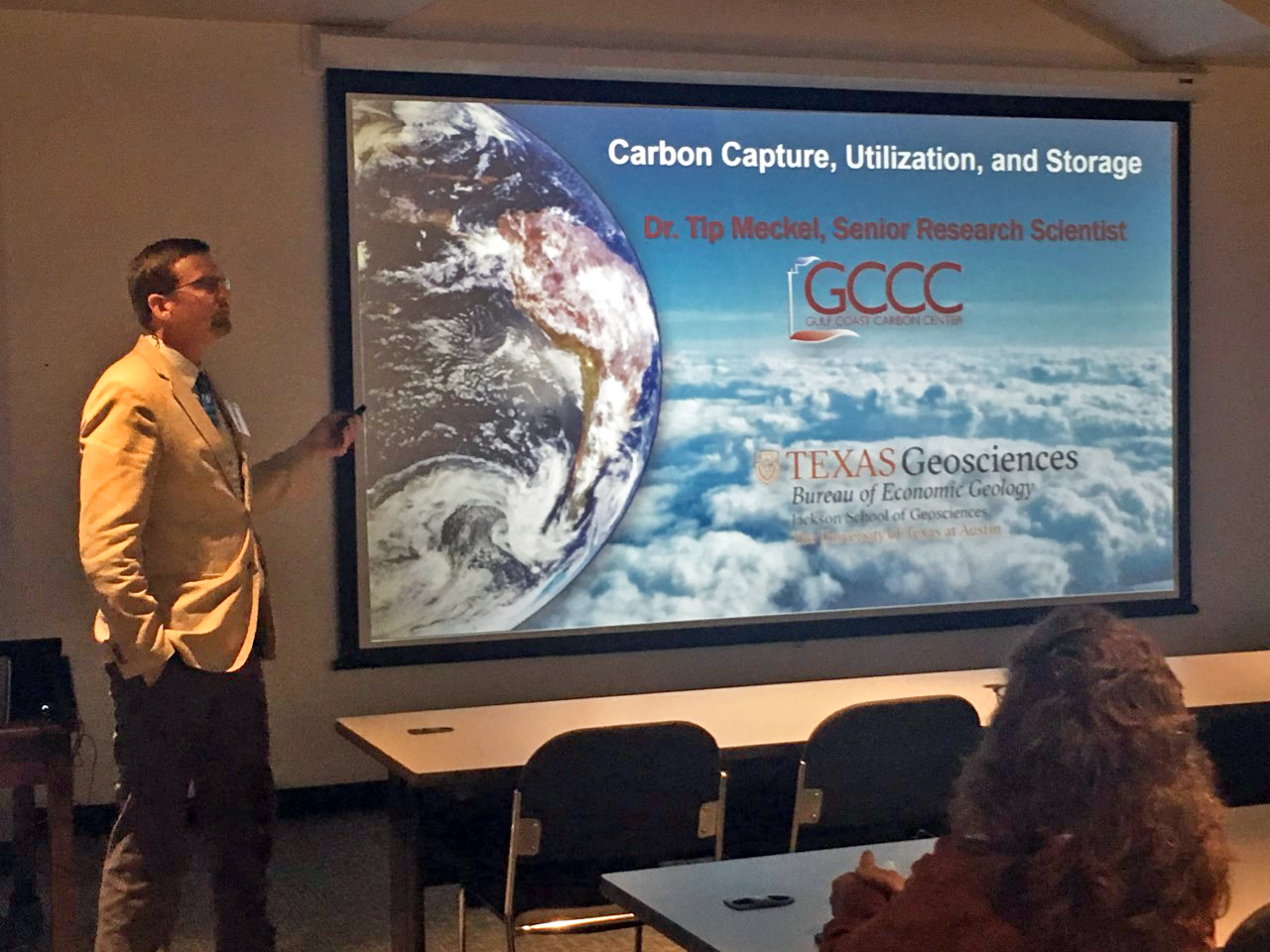
October 11, 2019: As part of the Earth Science Week Career Day, hosted by the Bureau of Economic Geology, GCCC student researchers demonstrate to dozens of middle school students the properties of carbon dioxide that make it a greenhouse gas, how to mitigate its effect on climate, and how dry ice (solid CO2) is denser than air and can make soap bubbles hover! The lesson plan is available here.
October 4, 2019: Vanessa Nuñez-López was invited to give a talk to the School of Geosciences at the University of Edinburgh as part of the Hutton Club seminar series. The Hutton Club is a seminar series that focuses on current topics in Earth surface processes including geomorphology, glaciology, and sedimentology, in which the group invites colleagues from other institutions. The session was reported as well attended by academics and postgraduates from the entire school. Nuñez-López is currently a visiting scholar at Imperial College London.
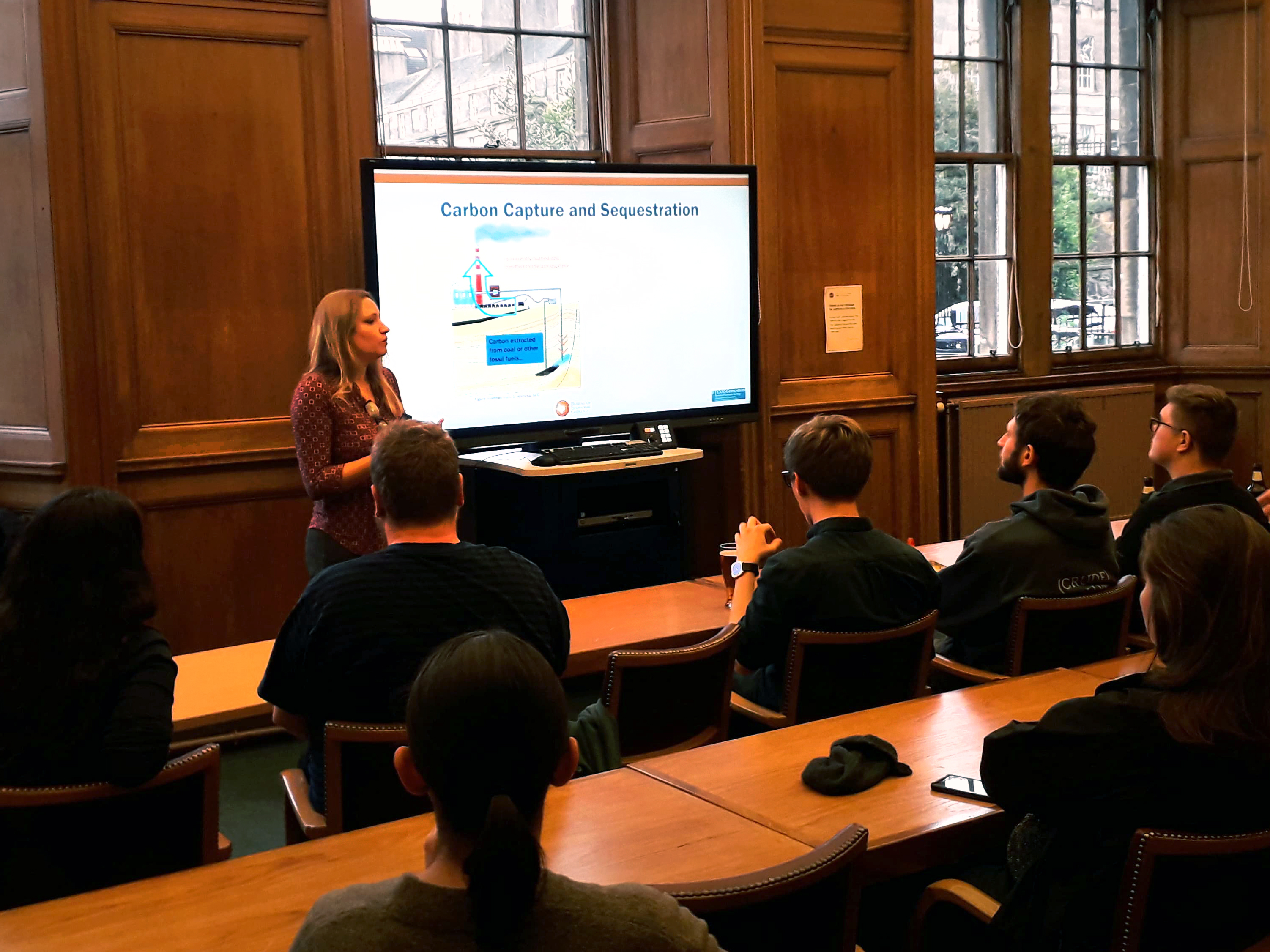
Vanessa Nuñez-López gave a talk to the University of Edinburgh School of Geosciences about her work on net carbon-negative oil (NCNO) and carbon emissions accounting as a part of enhanced oil recovery.
October 2, 2019: Several GCCC researchers participated in the Energy Institute's Energy Expo, presenting five posters to researchers across UT departments.
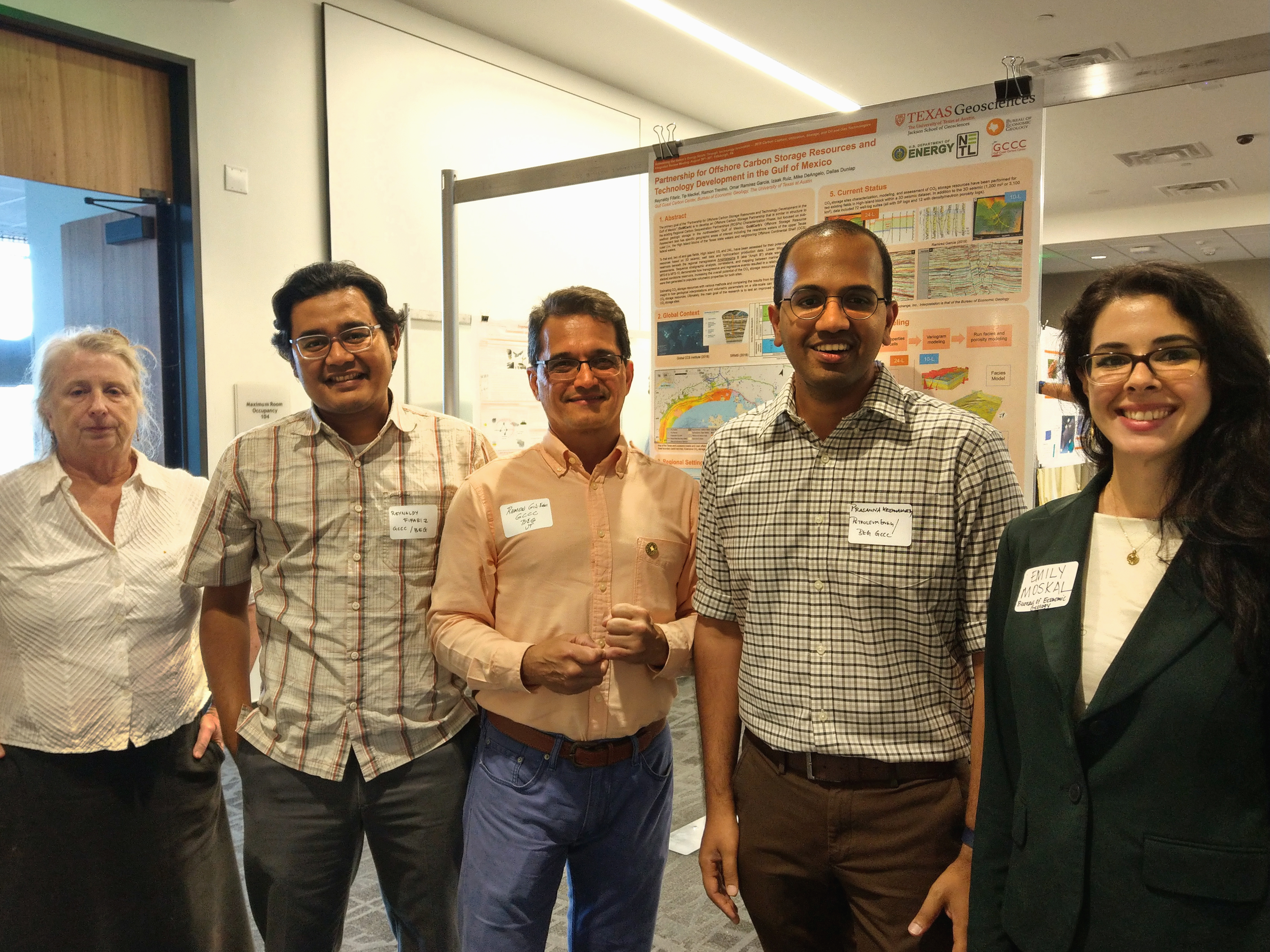
Reynaldy Fifariz (second from left), Ramon Gil-Egui, Prasanna Krishnamurthy, Emily Moskal, and Sahar Bakhshian (not pictured) presented posters at the UT Energy Expo. Susan Hovorka (left) leads the research group
October 2, 2019: Vanessa Nuñez-López and Emily Moskal's Frontiers of Climate paper about the climate mitigation potential of CO2 enhanced oil recovery was featured in the news by Vox.
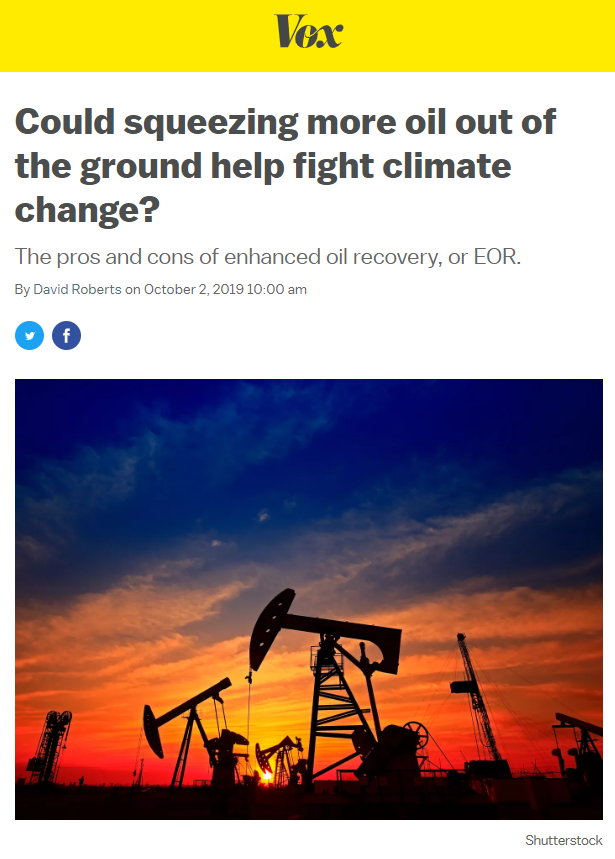
October 1, 2019: GCCC research program coordinator Emily Moskal participated in the first Energy Institute Faculty & Researcher Round-Up. It was a chance to learn about what is happening across the large campus related to energy, provide feedback on key challenges, learn from colleagues, and develop potential collaborations and partnerships across university departments.
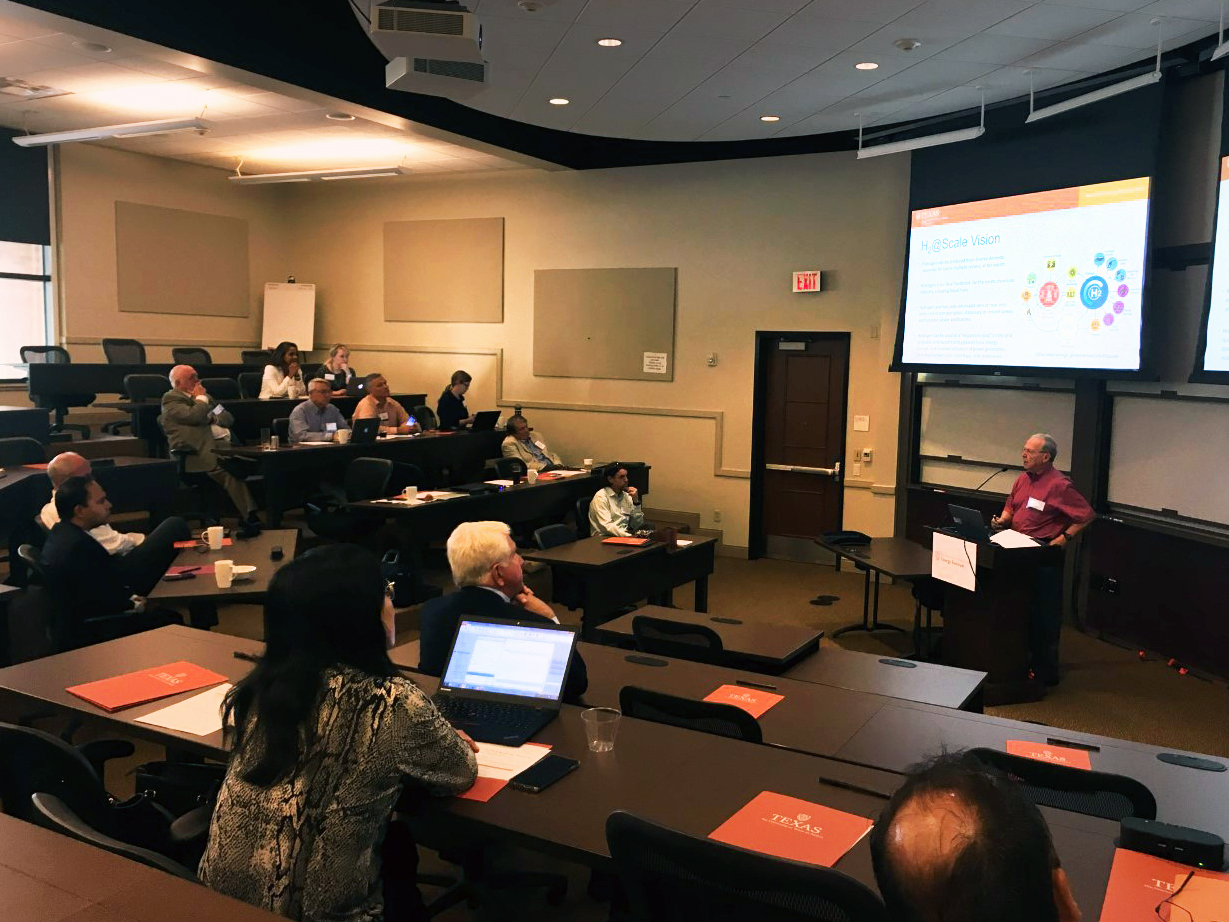
Alan Lloyd gave a talk about the challenges and opportunities facing developing hydrogen as a zero-emission energy carrier at commercial scales
October 1–30, 2019: Kristian Gundersen, a PhD student in applied mathematics at the University of Bergen in Norway, is a visiting scholar at GCCC during October. Gundersen is working on detection, localization, and quantification of CO2 leakages in marine environments as part of the Strategies for Environmental Monitoring of Marine Carbon Capture and Storage (STEMM-CCS) project. During Gundersen’s visit, he’ll work with Seyyed Hosseini on approaches for detecting and localizing subsurface CO2 leakages with machine learning methods.
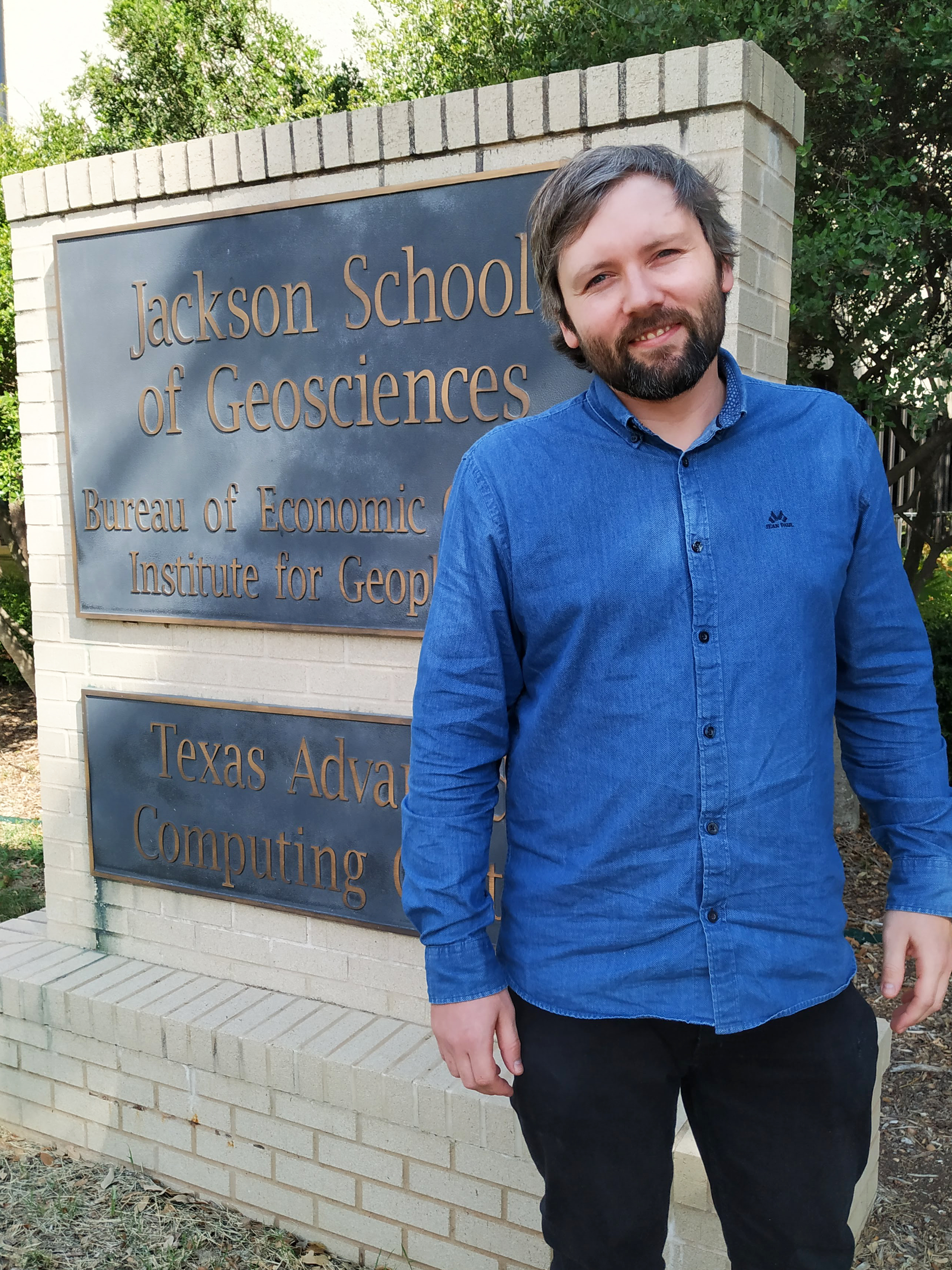
Kristian Gundersen, a PhD student from Norway, is a GCCC visiting scholar for the month of October, working with Seyyed Hosseini.
September 27, 2019: The School of Energy Resources at the University of Wyoming hosted Susan Hovorka as part of the Fall 2019 Speaker Series. She gave a talk titled "Geotechnical Progress Toward Making Carbon Capture and Storage Commercial". She had a chance to visit many of the facilities of the Energy Innovation Center in Laramie, including the High Bay Research Facility (with a focus on multiphase flow), the Wyoming State Geological Survey, the 3-D visualization lab, and the drilling simulator (pictured).
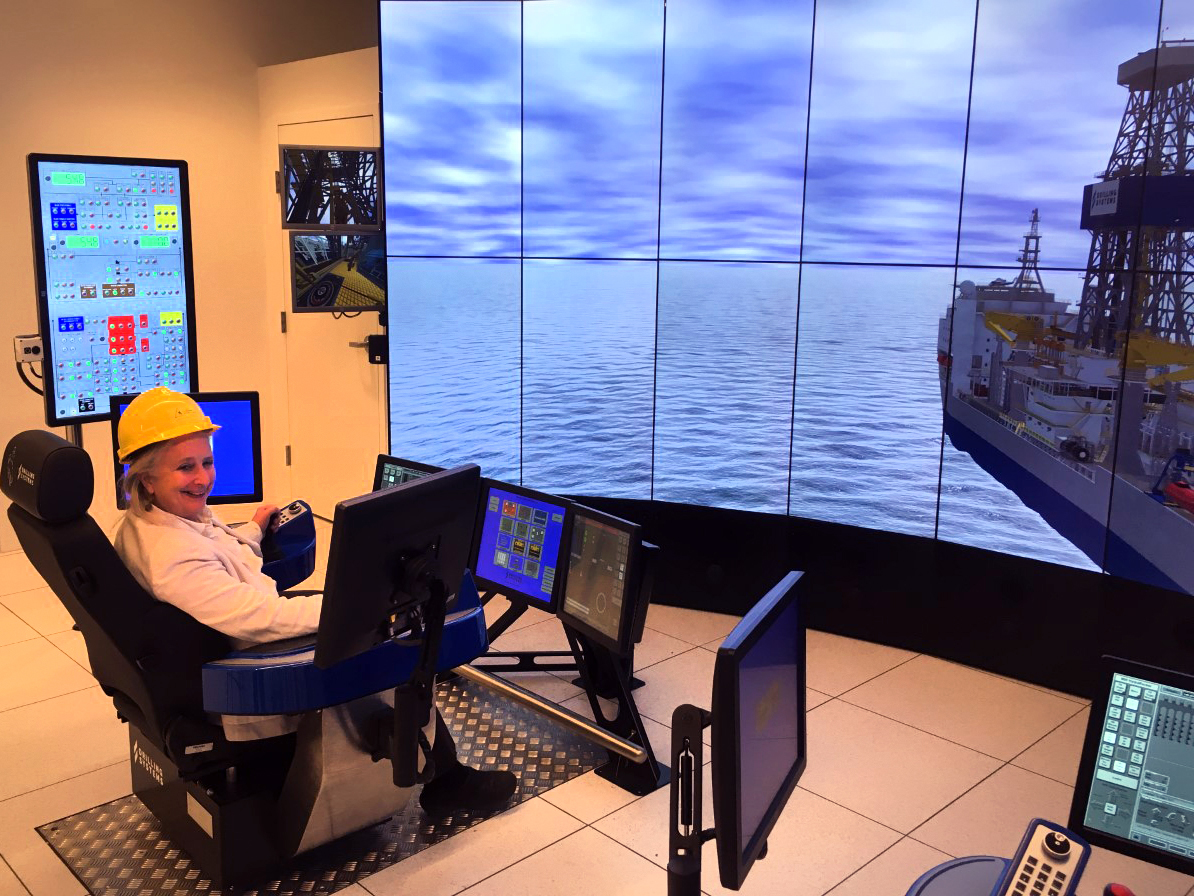
Susan Hovorka visits the drilling simulator at the Energy Innovation Center of the University of Wyoming
September 27, 2019: Several GCCC researchers presented their work at the 7th annual Bureau Research Symposium with nano talks and posters. GCCC undergraduate research assistant Margaret Murakami won best poster award for her poster, supervised by Sahar Bakhshian and Seyyed Hosseini, titled "A High Performance Lattice Boltzmann Solver with Applications to Multiphase Flow in Porous Media."
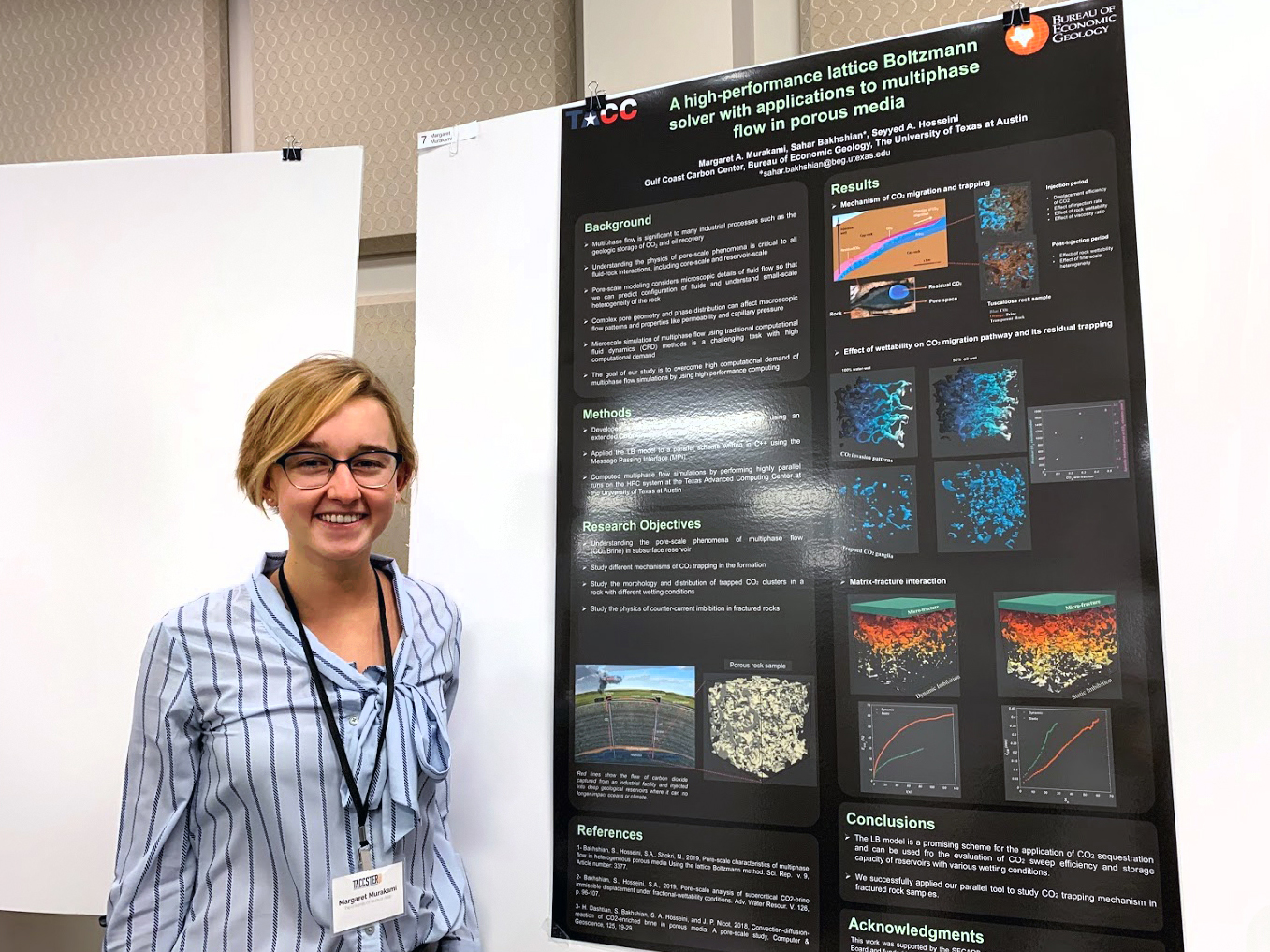
GCCC undergraduate research assistant Margaret Murakami won best poster award for the 2019 7th Annual Bureau Research Symposium
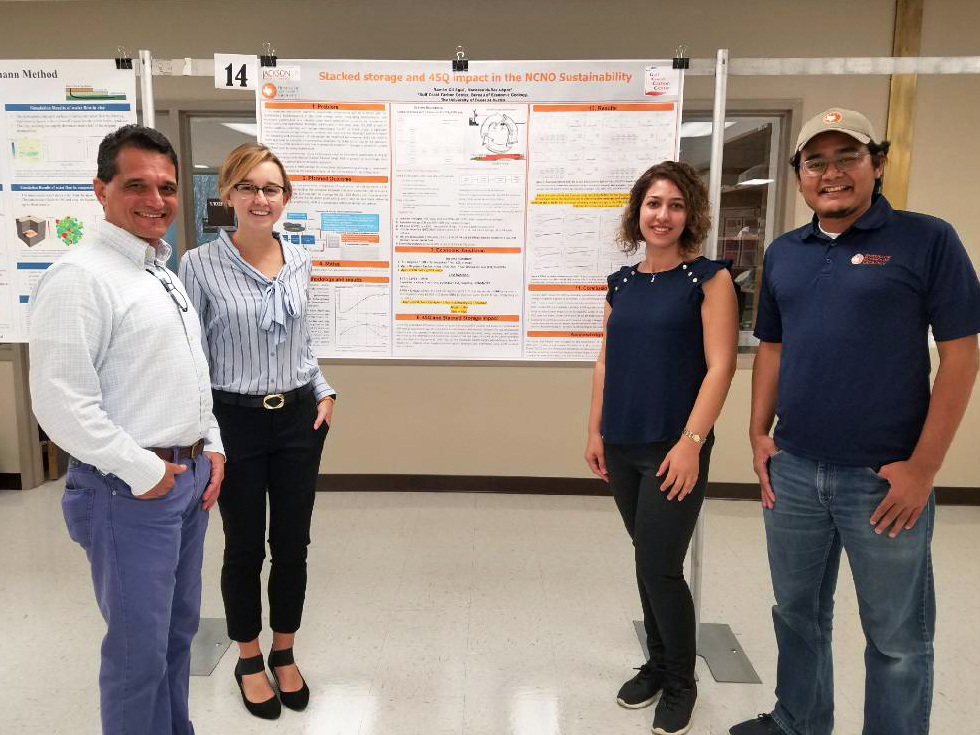
Ramon Gil-Egui, Margaret Murakami, Sahar Bakhshian, and Reynaldy Fifariz presented posters at the annual research symposium for the Bureau of Economic Geology
September 13, 2019: Earth and Energy Resources Director's Award recipient Omar Ramirez Garcia joined the GCCC weekly meeting to welcome the incoming fall semester master's students to the productive and collaborative research atmosphere at GCCC.
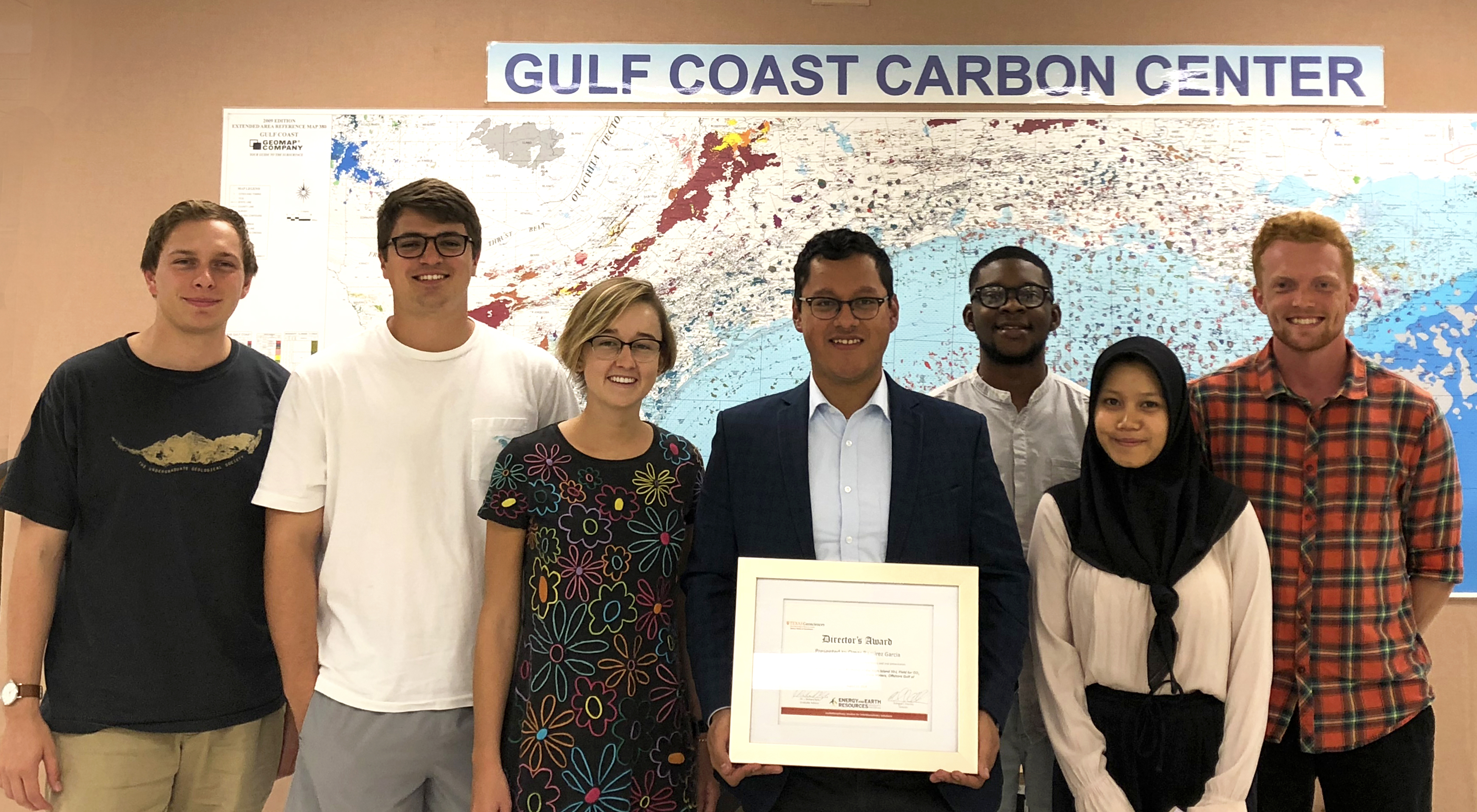
Omar holds his Director's Award for his excellent thesis with incoming GCCC master's students and Margaret, an undergraduate research assistant
September 13, 2019: Omar Ramirez Garcia, a recent master's graduate supervised by Dr. Tip Meckel of the Gulf Coast Carbon Center, received the Energy and Earth Resources Director's Award for his excellent research thesis on carbon capture and storage under the Gulf of Mexico. His thesis is titled "Geologic Characterization and Modeling for Quantifying CO2 Storage Capacity of the High Island 10-L Field in Texas State Waters, Offshore Gulf of Mexico." Read the abstract here.
Omar Ramirez Garcia (center) is pictured with the UT Jackson School of Geosciences Dean, Sharon Mosher (left), and the other recipient of the Energy and Earth Resources Director's Award recipient, Fernando Apango, and his supervisor. Ramirez Garcia's supervisor, Tip Meckel, isn't pictured.
September 12, 2019: Tip Meckel of GCCC moderated the panel, "Scaling to action: Making CCUS projects happen", that discussed the learnings from the first generation of projects and how to accelerate the growth of CCUS at this month's Oil and Gas Climate Initiative (OGCI) CCUS Investments Day. It was the first OGCI Investment Day devoted to CCUS.
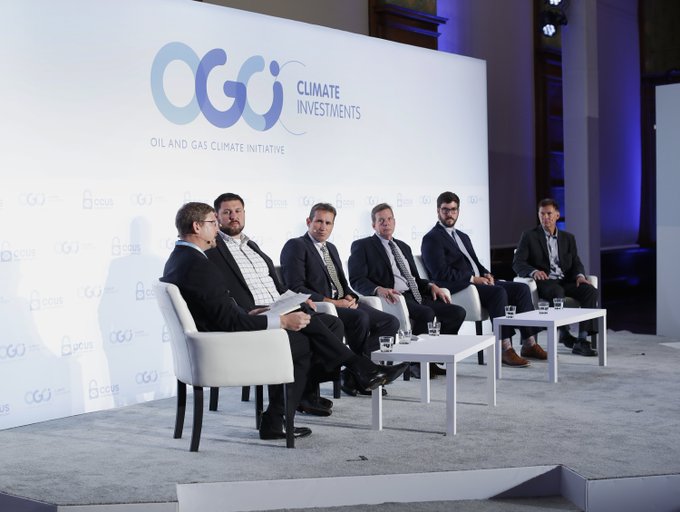
GCCC senior researcher Tip Meckel moderates a panel at this year's OGCI Investment Day devoted to CCUS.
August 27, 2019: The GoMCarb research and outreach team, as well as the advisory committee, met in person for the quarterly meeting in Pittsburgh while attending the annual Addressing the Nation’s Energy Needs Through Technology Innovation – 2019 Carbon Capture, Utilization, Storage, and Oil and Gas Technologies Integrated Review Meeting organized by National Energy Technology Laboratory. Katherine Dombrowski from Trimeric Corporation, involved in Task 5 of the partnership, gave a presentation on surface-level CCS infrastructure, including details like pipeline requirements and more. Several GCCC researchers gave talks at the DOE review meeting.
Katherine Dombrowski from Trimeric gives a presentation on CCS above-ground infrastructure titled, "Assessing Infrastructure in Gulf of Mexico: Status of Findings"
August 22, 2019: GCCC research program coordinator Emily Moskal participated in the University of Texas at Austin's University Communications Writing Workshop where she learned from external experts as well as from the university's top communicators about storytelling techniques, how to build a communication strategy plan, and leadership communications to ensure thae GCCC's unique story is positioned well internally, among project partners, sponsor, and to the press.
August 7–10, 2019: Collaborator Won-Ki Moon from UT's advertising school presented his GoMCarb-project work at the Association for Education in Journalism and Mass Communication (AEJMC) 2019 conference in Toronto, Canada. Moon presented his poster titled, Predicting Public Support for Carbon Capture and Storage Policy. Download the poster here. The association and its conference are one of the world's largest gatherings for research in journalism and mass communication like public relations, advertising, and media management.
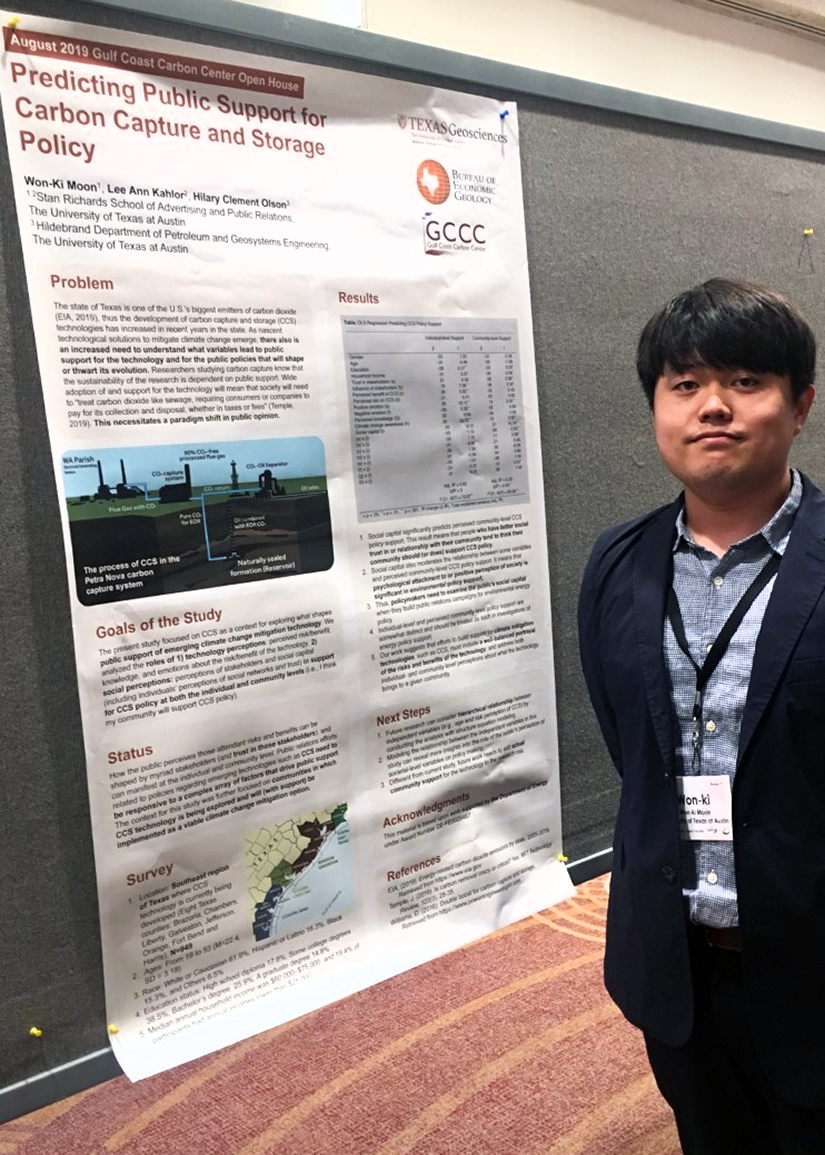
Won-Ki Moon presents "Predicting Public Support for Carbon Capture and Storage Policy" at one of the world's largest conferences for mass communications
August 6, 2019: GCCC hosted the summer sponsor meeting at the Bureau's Houston Research Center with a morning open house, which included a poster session on the latest GCCC research since the last sponsor meeting in January. Sponsors can view materials from the day here.
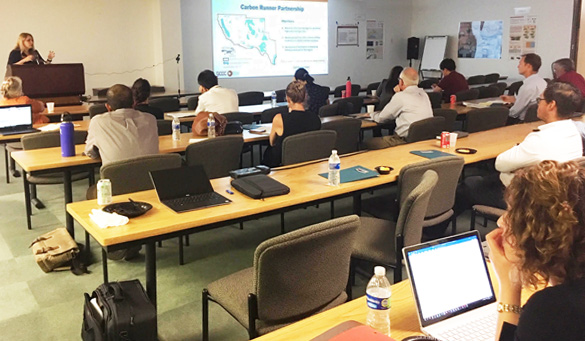
July 23–25, 2019: GCCC research scientist Patrick Mickler attended the 10th International Environmental Forum for CCS in Seoul, South Korea. The forum was a mix of general and technical talks from international and local scientists and a field trip to a site where CO2 leaks are simulated to gather monitoring data, which includes several groundwater studies as part of the Korea CO2 Storage Environmental Management (K-COSEM) research center and test site.
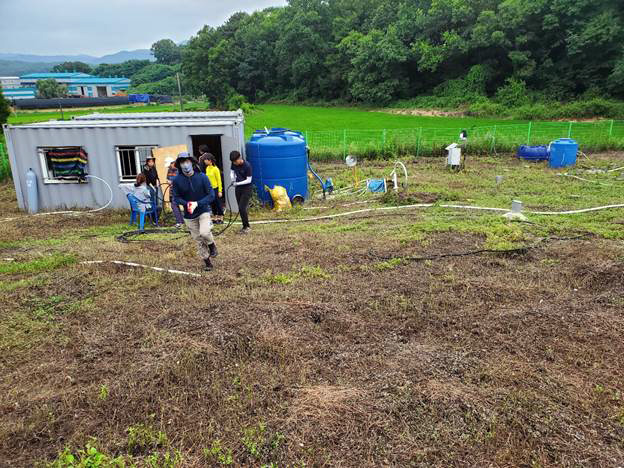
A K-COSEM project studies groundwater and vadose zone monitoring at a near-surface injection test site includes a shack to house electronics in downhole monitors, blue tanks for mixing groundwater and CO2 and injection and sampling wells shown by white PVC tubes on the surface.
July 7–12, 2019: Katherine Romanak instructs at the 13th IEAGHG Summer School. The summer school provides a 5-day intensive on all aspects of carbon capture and storage for early-career practitioners and students, including session themes on health and safety, policy, economics, and industrial uses of CO2 . The program has been held in seven countries with attendees from 50 countries since the program started. This year the summer school was held in Regina, Canada and included a field trip to the Boundary Dam 3 CCS Facility and Aquistore storage site. Romanak taught a session titled "Shallow Monitoring & Verification (Onshore & Offshore)".
.jpeg)
Romanak lectures at the IEAGHG Summer School
June 19–20, 2019: Tip Meckel chaired the Mission Innovation workshop Topic 4: Storage Monitoring in Trondheim, Norway. The workshop aims to increase technology readiness levels for early, innovative projects to push them to development and provide guidance paths for emerging CCUS technologies, including collaboration opportunities.

June 17–19, 2019: Katherine Romanak and Tip Meckel attended the 10th Trondheim Conference on CO2 Capture, Transport, and Storage (TCCS-10) in Norway. Romanak delivered a keynote on Wednesday titled, “Revelations in monitoring: Why environmental monitoring isn’t just for leakage anymore”, and chaired the CO2 injectivity and EOR panel. Meckel gave his talk, “Perspectives of offshore CCS from the northern Gulf of Mexico, USA”, for the storage site characterization group. The conference is one of the largest and best known for knowledge transfer within the CCS field with 150 oral presentations, six sessions, more than 100 poster presentations, and participants from more than 25 countries.
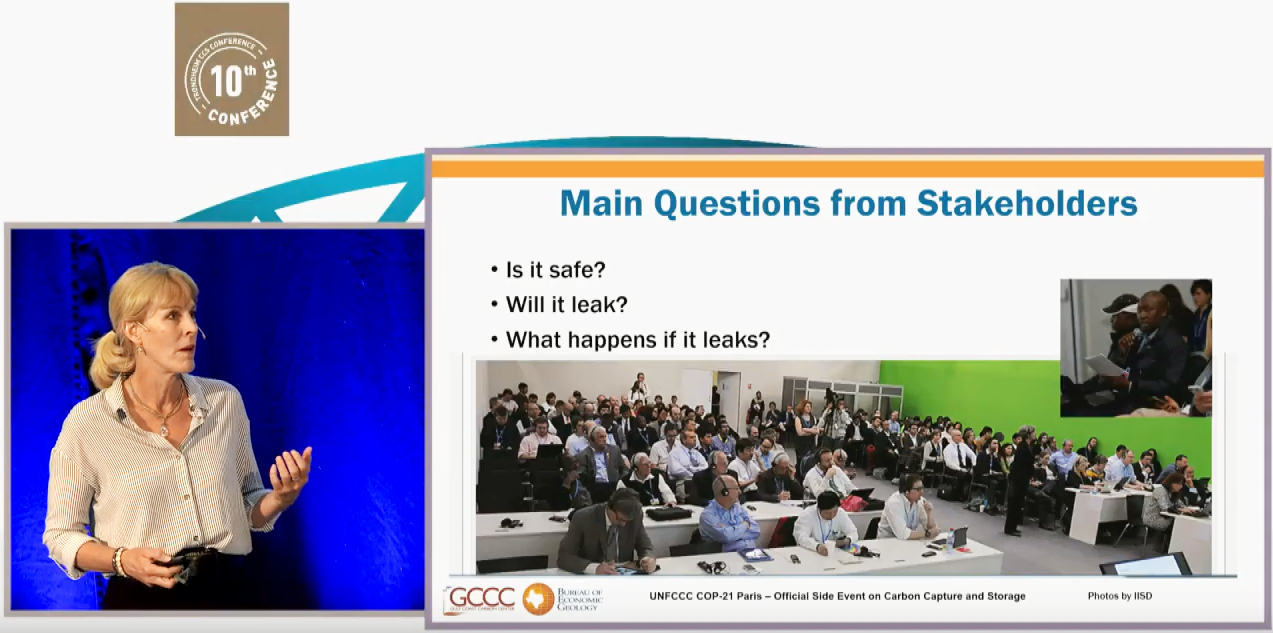
Katherine said during her talk that the main questions from stakeholders are "Is it safe?", "Will it leak?", and "What happens if it leaks?". Watch the official TCCS video to hear her answers.
June 11, 2019: GCCC outreach coordinator Sarah Prentice and undergraduate research assistant Margaret Murakami presented at the Groundwater to the Gulf (G2G) summer institute at the Lady Bird Johnson Wildflower Center in Austin. The institute is a 3-day, field-trip based programming from local water experts for Central Texas teachers that emphasizes techniques for teaching water-based curricula for grades 4 through 8. Educators bring lessons back to their classroom about the path of water from its origin in Central Texas to its destination in the Gulf of Mexico. Sarah and Margaret presented “CO2--Too Much of a Good Thing?” a free curriculum with TEKS-aligned activities, and resources for 50 local educators. The institute contributors include representatives from Texas Parks and Wildlife Department, City of Austin Watershed Protection and Wildlife Preserves, the Lower Colorado River Authority, Westcave Preserve, among others. Download the lesson plan here.
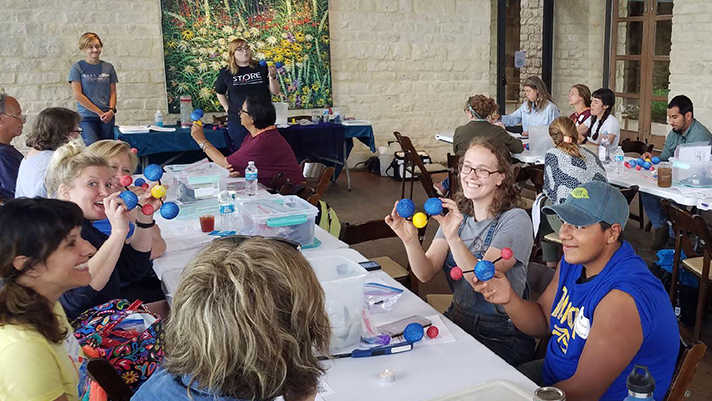
GCCC outreach volunteers teach 50 local teachers about carbon capture at the Groundwater to the Gulf (G2G) summer institute
June 11, 2019: Tip Meckel partnered with the Port Arthur, Texas Chamber of Commerce to hold a meeting for local decision-makers and stakeholders to learn about the current CO2 management and the available federal 45Q tax credit opportunities and how energy companies can qualify for in order to receive significant tax credits for near-term projects that avoid carbon dioxide emissions.
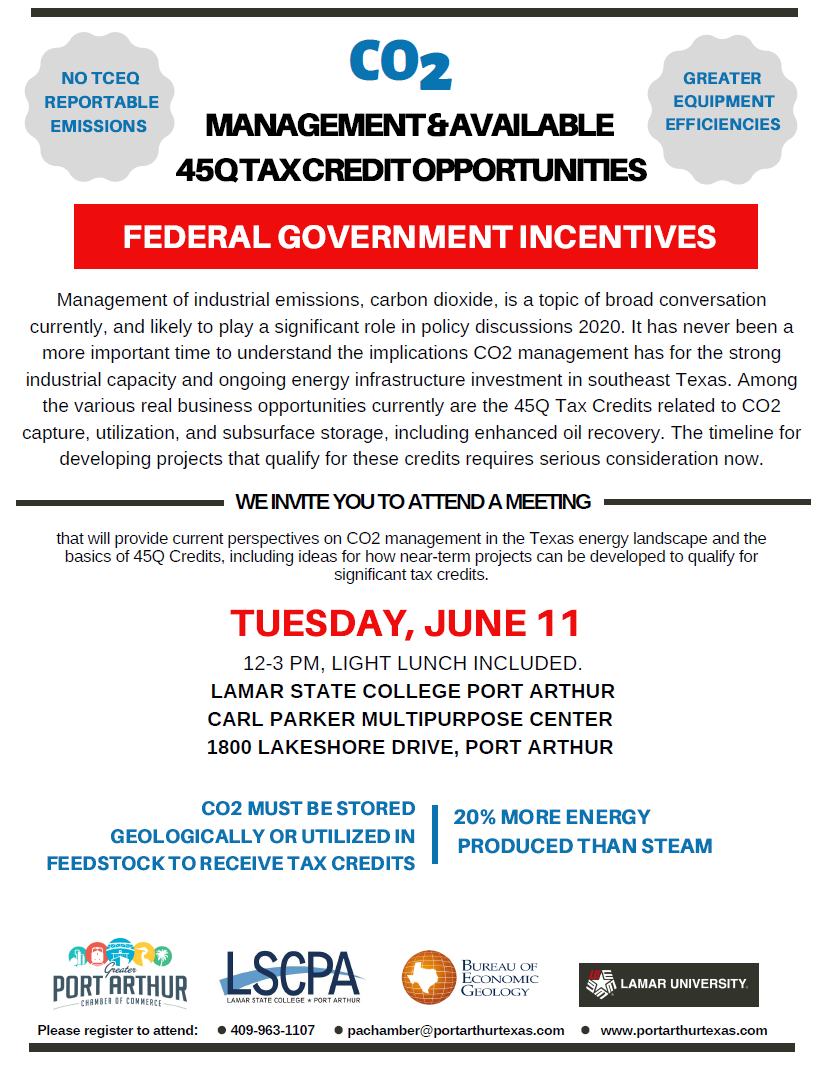
June 10, 2019: A novel application of high-resolution 3D seismic (HR3D) helped GCCC scientists monitor an offshore carbon storage site near Tomakomai, Japan more precisely by offering more detailed and precise images of the subsurface above the injection zone. Read about the benefits and potential of the technology for monitoring large-scale, commercial offshore carbon storage with 50 days' free access to the study published online today in the International Journal of Greenhouse Gas Control titled, "High-resolution 3D marine seismic acquisition in the overburden at the Tomakomai CO2 storage project, offshore Hokkaido, Japan".
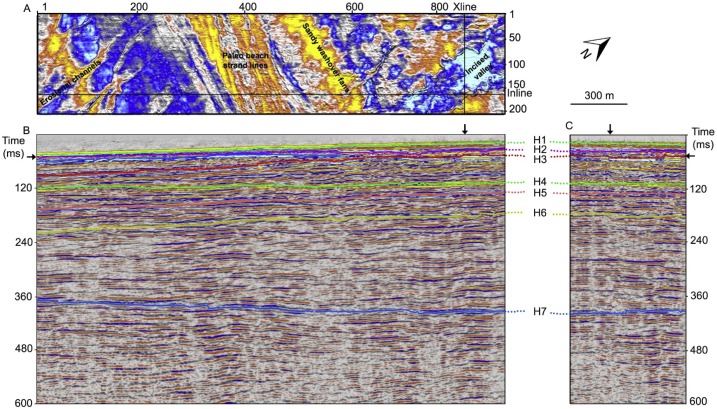
Initial processed volume and interpretation of the HR3D seismic from the CO2 injection site near Tomakomai, Japan from a study published today
May 24–June 3, 2019: GCCC Senior Researcher Tip Meckel attended a field trip in late May in Utah sponsored by the ExxonMobil UT Energy Scholars Program. Also in attendance were UT professors and researchers from the UT Petroleum & Geosystems Engineering Department (Espinoza, Tavassoli, Sun, and Zheng), as well as various researchers from the Massachusetts Institute of Technology and specialists from ExxonMobil. The purpose of the 3-day trip was to observe fault zone complexity in outcrops in southeastern Utah, in order to properly conceptualize them in reservoir simulations of CO2 injection. The photo shows the UT group at the famous Little Grand Wash fault zone (can you spot it behind us?), which has associated CO2 and petroleum expression at the surface.
Tip Meckel (left) attends ExxonMobil-sponsored UT Energy Scholars Program field trip to Little Grand Wash in Utah.
May 22-24, 2019: Susan Hovorka participated in a study group on the global mapping of negative emissions technologies in Edinburgh, Scotland led by Jennifer Wilcox of the Worcester Polytechnic Institute and Florian Kraxner of the International Institute for Applied Systems Analysis. This working group assessed diverse pathways to attain negative emissions. Hovorka was able to provide information about storage in deep saline formations and associated with enhanced oil recovery, and discussed how monitoring approaches developed to document carbon retention for these technologies might be applied to related storage types, such as basalt storage.
May 22, 2019: We are proud of our 2018 MSc graduate Reinaldo Sabbagh, who has received the Best Poster Award from the AAPG’s Division of Environmental Geosciences (DEG) from last year’s 2018 ACE meeting. The poster is entitled: “Pre-Injection Reservoir Characterization for CO2 Storage in the Near Offshore Areas of the Texas Gulf of Mexico”. Reinaldo will receive the award May 22 at the joint DEG/EMD luncheon at the 2019 AAPG Annual Convention and Exhibition in San Antonio, Texas. Reinaldo is currently a Research Scientist Associate III at the Bureau of Economic Geology, where he contributes to subsurface geologic model development.
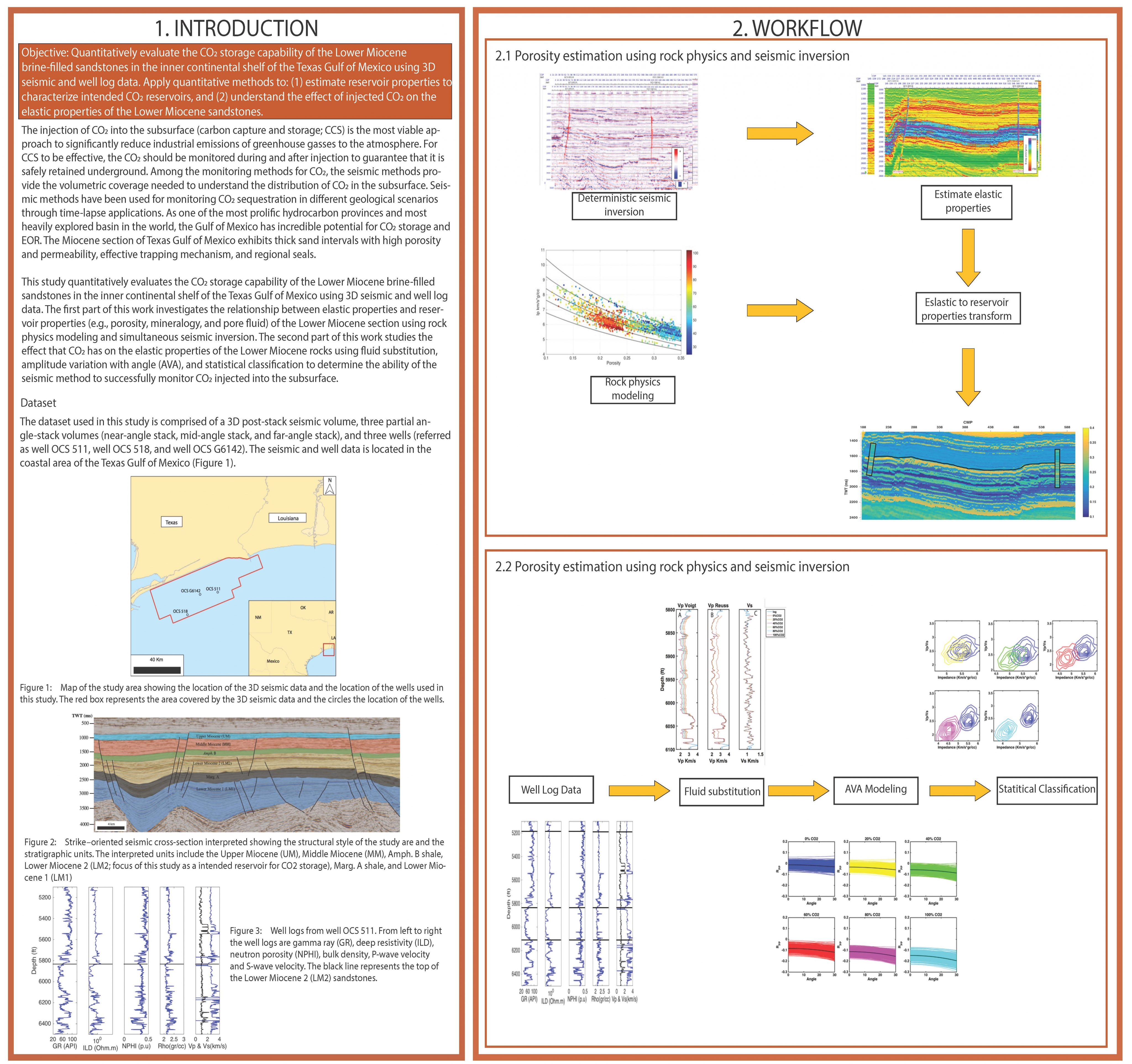
May 11, 2019: Katherine Romanak's partnership with two universities in Trinidad and Tobago was featured throughout the day on the Spectrum News channel in Austin.
May 8–9, 2019: Ramón H. Treviño presented at the Offshore Technology Conference held annually in Houston. The conference is for energy professionals to transfer knowledge and skills to further scientific and technical advancements in offshore environments. View slides from the conference talks, What Offshore CCS Will Look Like in The Gulf of Mexico: Perspectives from Texas and Monitoring Stored CO2 to Document Permanence.
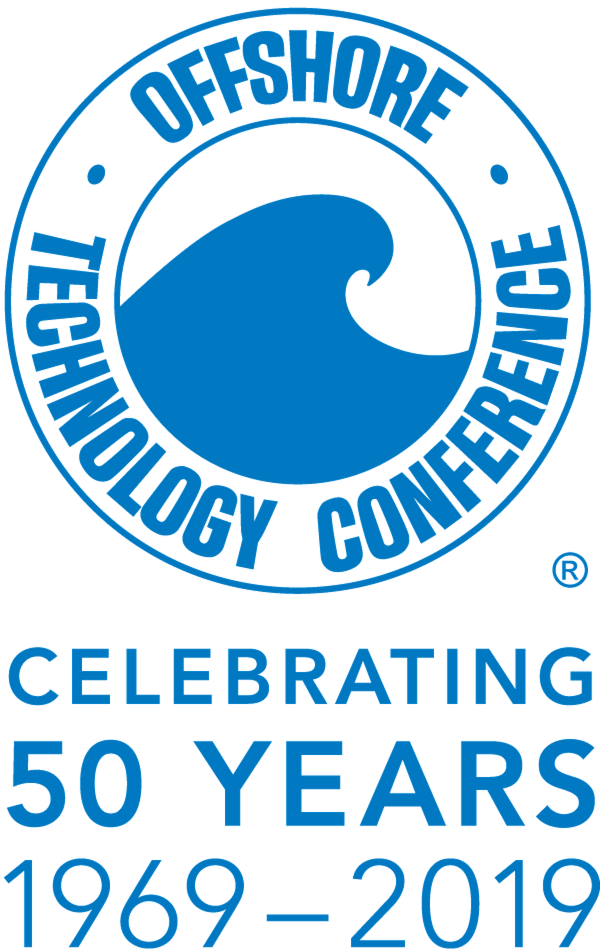
May 6–9, 2019: Tip Meckel attended the Gordon Research Conference on CCUS in Switzerland. The conference series provides an international forum for the presentation and discussion of frontier research on capture, utilization, and storage of carbon dioxide. Various aspects of CCUS were discussed by participants, including ongoing scientific breakthroughs and systemic aspects, its role in enabling negative emissions and in various industrial sectors. Tip presented posters on the collaborative studies of the offshore Gulf of Mexico (authored by Ramón Treviño and Susan Hovorka) as well as the laboratory study of heterogeneity effects on buoyant fluid migration and saturation (authored by Prasanna Krishnamurthy).
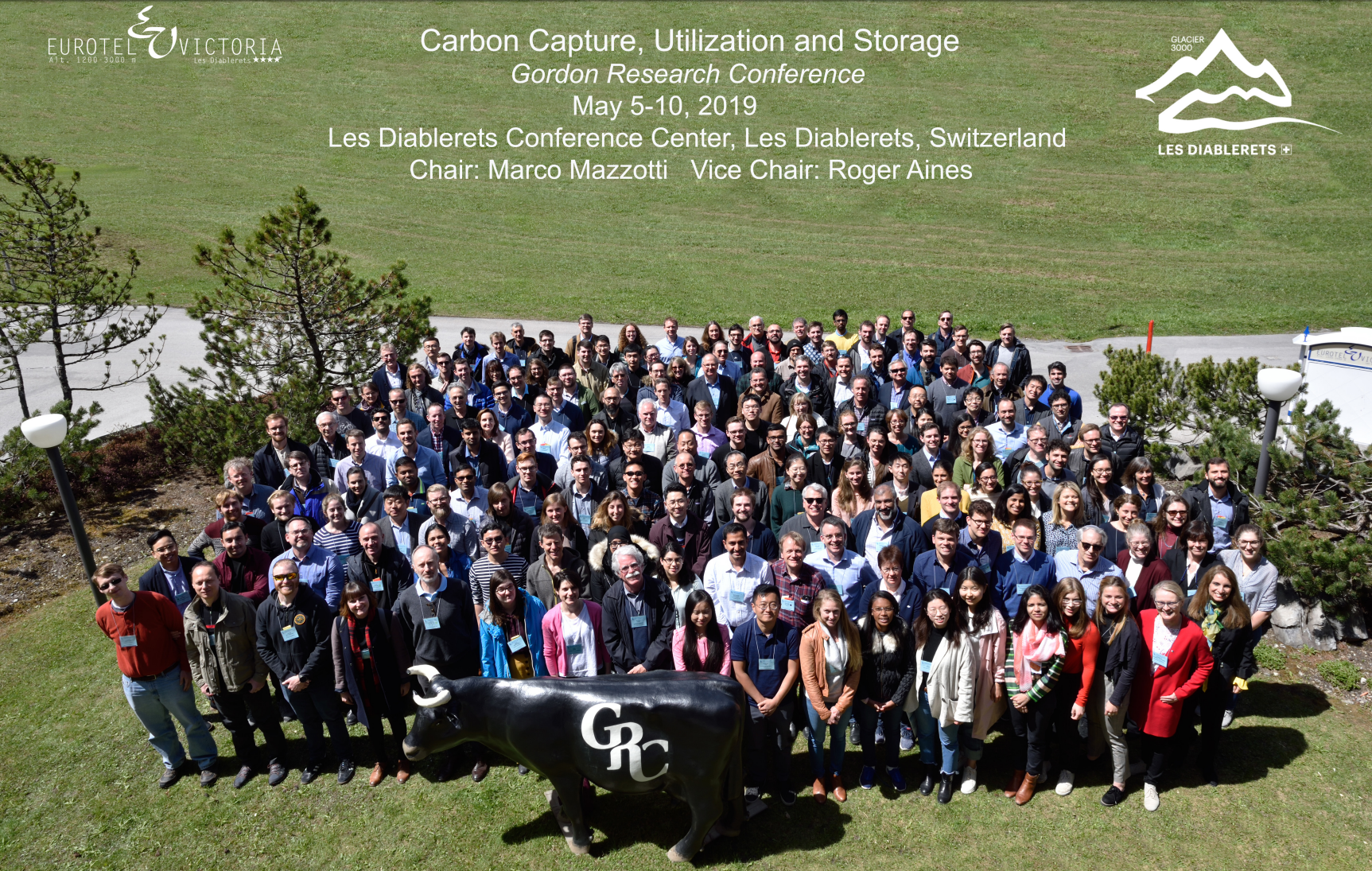
Roughly 200 participants attended the Gordon Research Conference in Switzerland to discuss applications in the use of carbon dioxide.
May 6–8, 2019: Susan Hovorka attended the 14th CO2GeoNet Open Forum in Venice, Italy. Hovorka co-chaired Session 4: "Communication – Putting People at the Centre Engaging with, and Creating Benefits for the Community" and gave a talk titled, "Optimizing Monitoring to Document Storage Permanence: Lessons Learned at SECARB 'Early' Test at Cranfield" for Session 3: Monitoring. Download her presentation slides here.
May 6, 2019: Katherine Romanak's partnership with two Trinidad and Tobago universities was featured in a press release titled, Partnership Seeks to Fight Climate Change and Boost Caribbean Nation’s Economy, which was distributed by the university to local, national, and Caribbean news outlets. Read the release here.
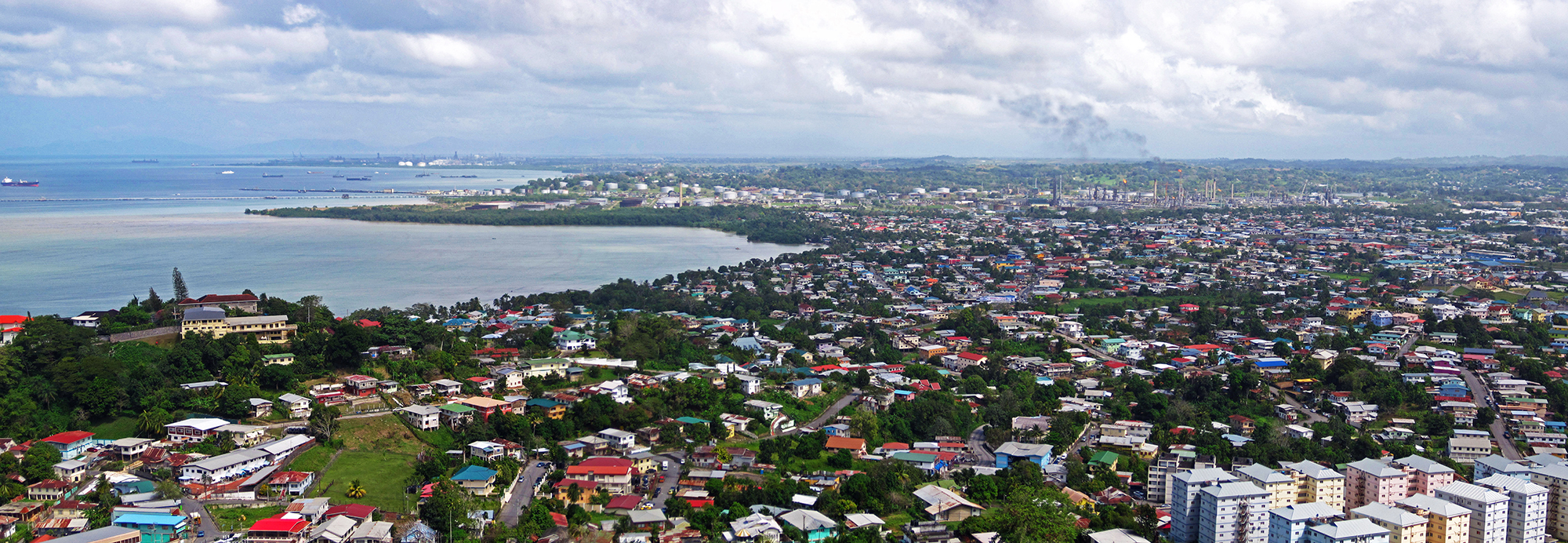
Trinidad is creating a new workforce to capture emissions in an effort to make the islands less susceptible to climate change impacts. Photo by Derrick Midwinter
May 1, 2019: Graduate research assistants Izaak Ruiz and Omar Ramirez Garcia give a practice presentation to GCCC members, including his research advisor Tip Meckel, preceding his official thesis defense later this month.
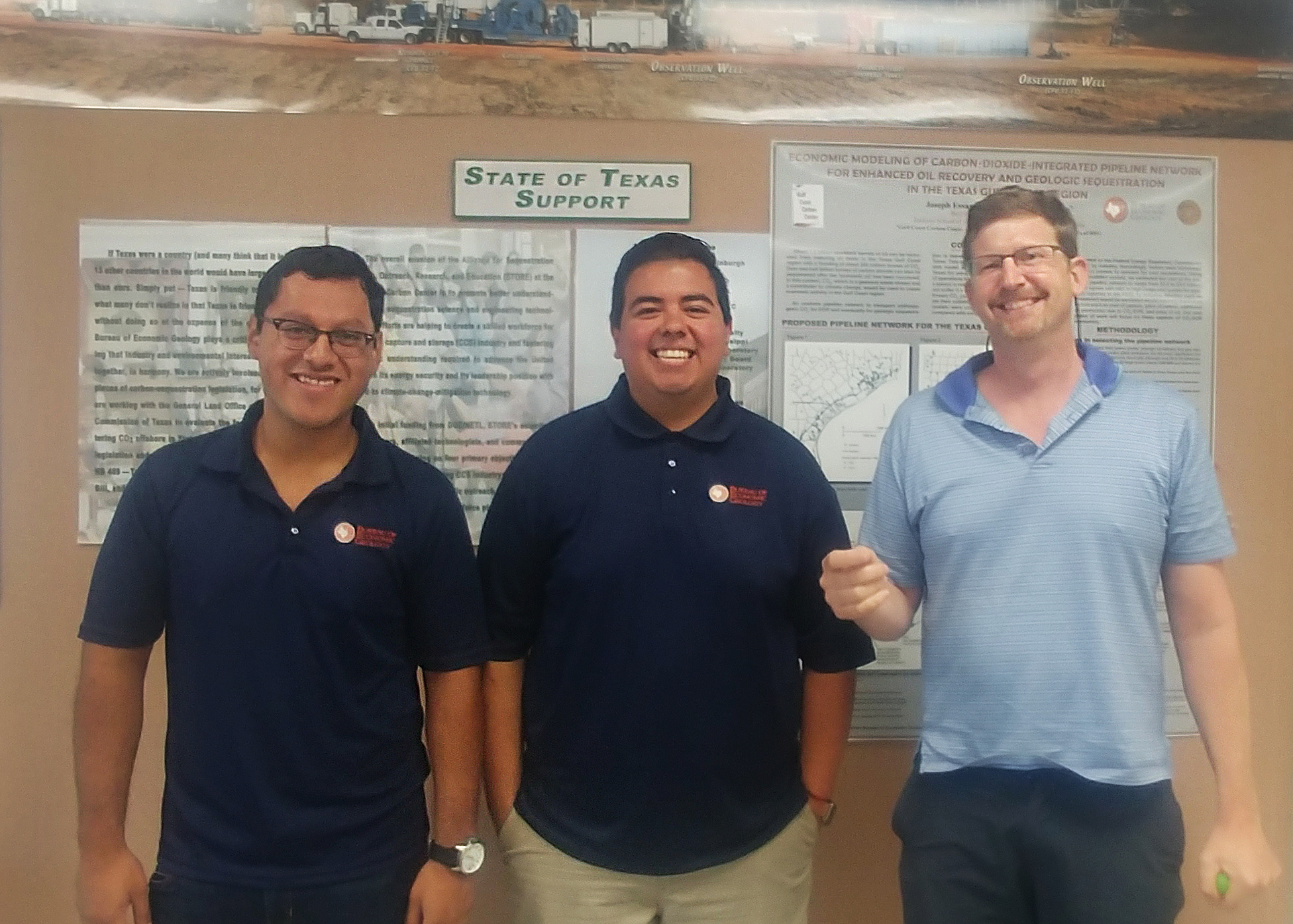
Omar Ramirez Garcia (left), Izaak Ruiz (middle), and advisor Tip Meckel before the final practice presentation before graduate theses defenses.
April 30, 2019: Multiple women from the Bureau of Economic Geology, including GCCC post-doc Sahar Bakhshian, networked at the 5th annual GLOW Evening of Science and Leadership Banquet. GLOW stands for Geoscience Leadership Organization for Women and is a chance for women students, staff, and faculty members to meet each other and network with other industry professionals.
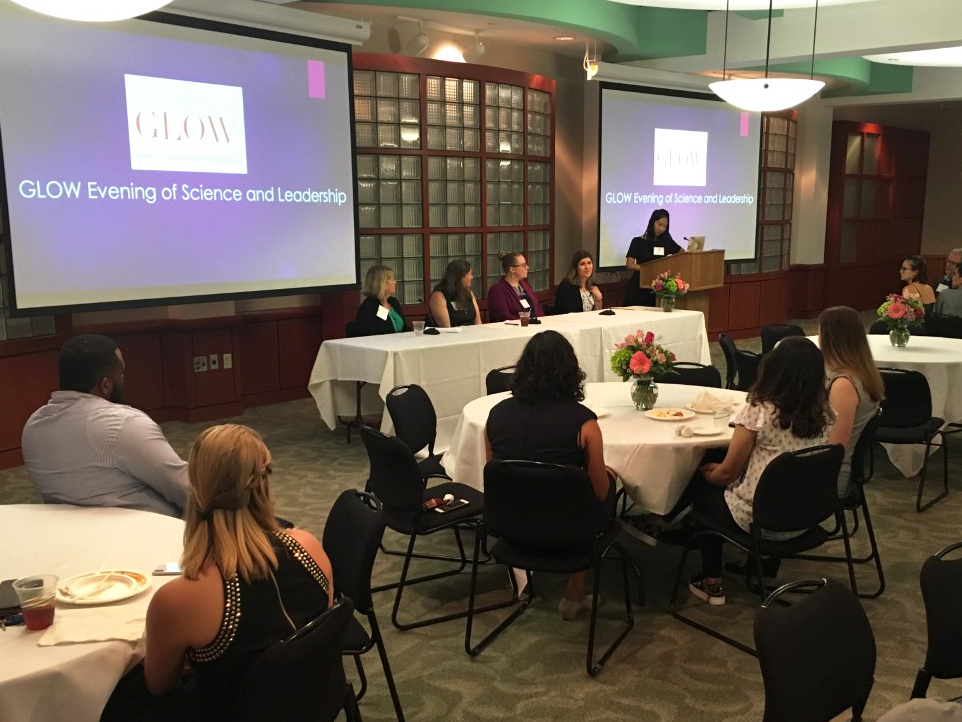
April 23-26: Katherine Romanak and Susan Hovorka attended the MGSC annual Meeting and the Carbon Sequestration Leadership Forum (CSLF) Technical group meeting that followed in Champaign, IL. Romanak and Hovorka presented their presentation titled, “Advancing Toward Commercialization Final Stages of the SECARB Early Test" to CSLF and received an award for completion of the SECARB Early Test, a CSLF-recognized project, from Åsa Slagturn, the CSLF Technical Group chair. Romanak also participated in Team CCS during the Illinois marathon.
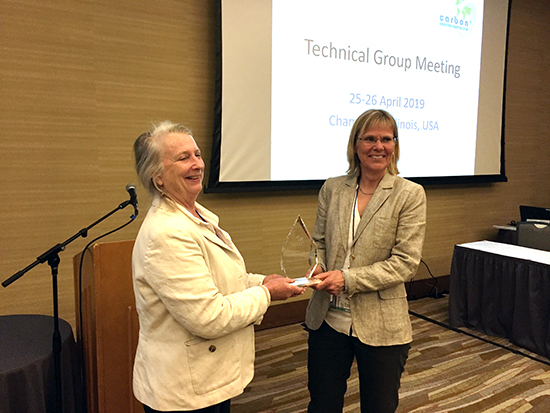
Researchers Susan Hovorka (pictured) and Katherine Romanak receive an award from Asa Slagturn for the completion of SECARB's CSLF-recognized project.
April 15-16, 2019: GCCC program manager Ramón H. Treviño attended the field trip and presented at the Texas Chapter of the annual American Beach and Shoreline Preservation Association symposium, engaging with a variety of coastal stakeholder professionals that work along the Texas coastline.
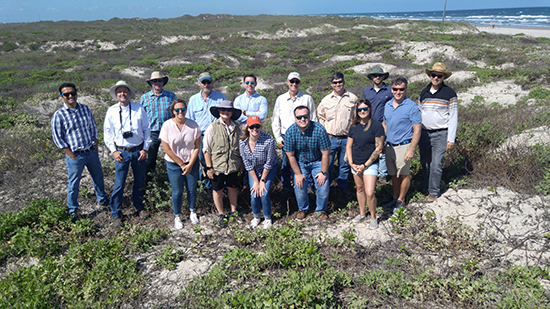
GCCC program manager Ramón Treviño (far right) joins ASBPA on a field trip stop that explored the geological processes behind the sand dunes on Mustang Island
April 15, 2019: GCCC research associate Vanessa Nuñez-López presented at the monthly lunch meeting of the Austin Women in Oil & Gas. Roughly 20 professionals attended and networked with Vanessa to learn more about CO2 enhanced oil recovery and how operators can reduce project lifecycle emissions to zero.
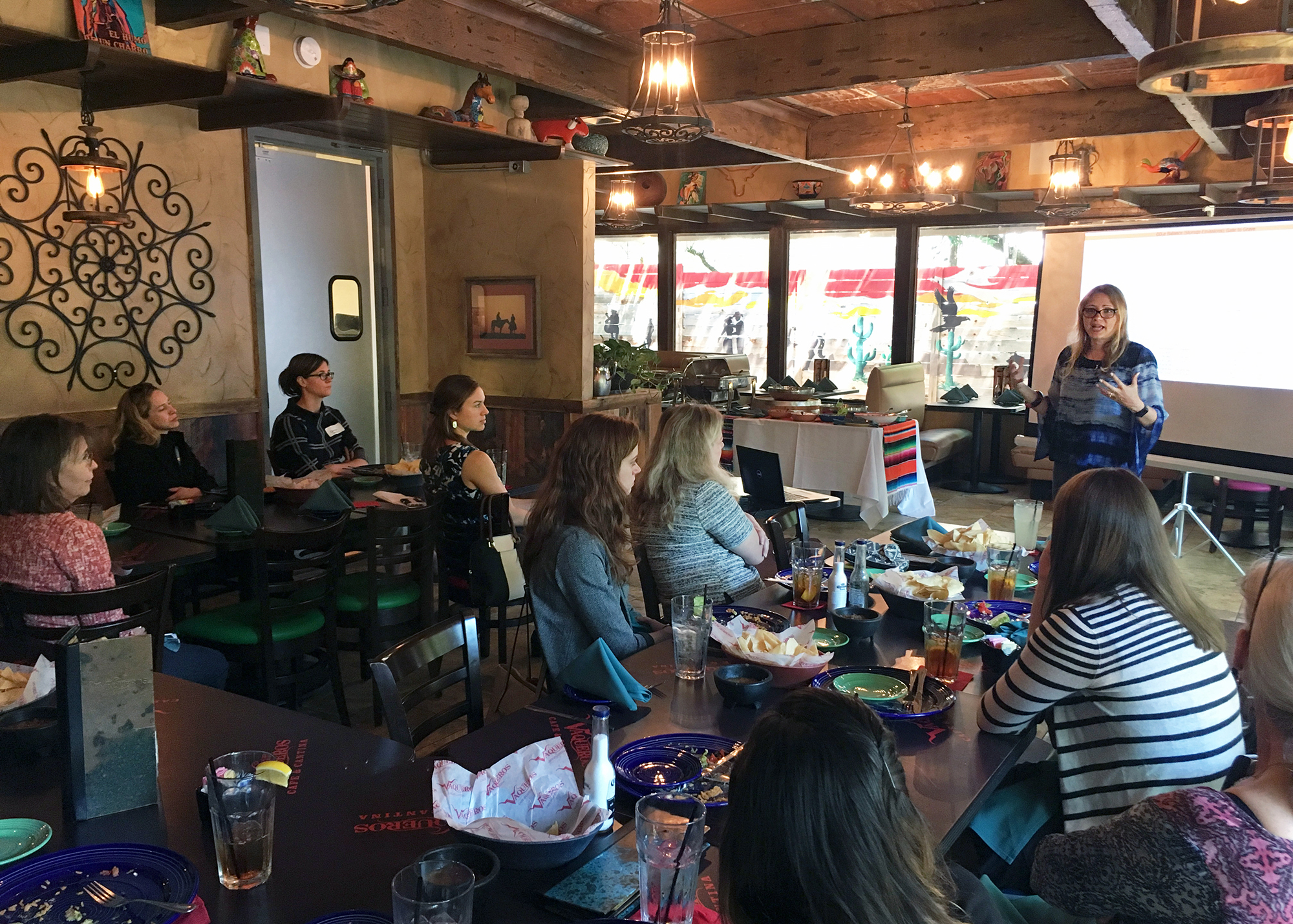
Vanessa Nunez-Lopez speaks about her experiences in the oil and gas industry and then academia at the Austin Women in Oil & Gas seminar lunch
April 10, 2019: The University of Texas at Austin is proud to be associated with BP's sponsorship of the GCCC, an activity accredited by BP's Advancing Low Carbon program. Activities under the accreditation include efforts within BP to lower emissions such as low-carbon fuels and lubricants, partnerships with startups developing innovative technologies, to global research initiatives, including academic research consortiums like GCCC. In order to qualify for the accreditation, programs must meet selective criteria and be independently validated by a third-party assurance company. BP's website states that "53 million tonnes of CO2 equivalent have been saved or offset through activities delivered by BP, and 4.7 million tonnes through activities delivered by BP partners since the programme began in 2017." GCCC is a part of the global initiative to reduce and offset carbon emissions.

April 10, 2019: GCCC research scientist Katherine Romanak recorded an episode with podcast hosts of the American Shoreline Podcast. In the episode, Romanak explains the risk monitoring measures that carbon capture and storage projects take to ensure safe and long-term storage of carbon dioxide below the ground. Listen to the podcast episode here.
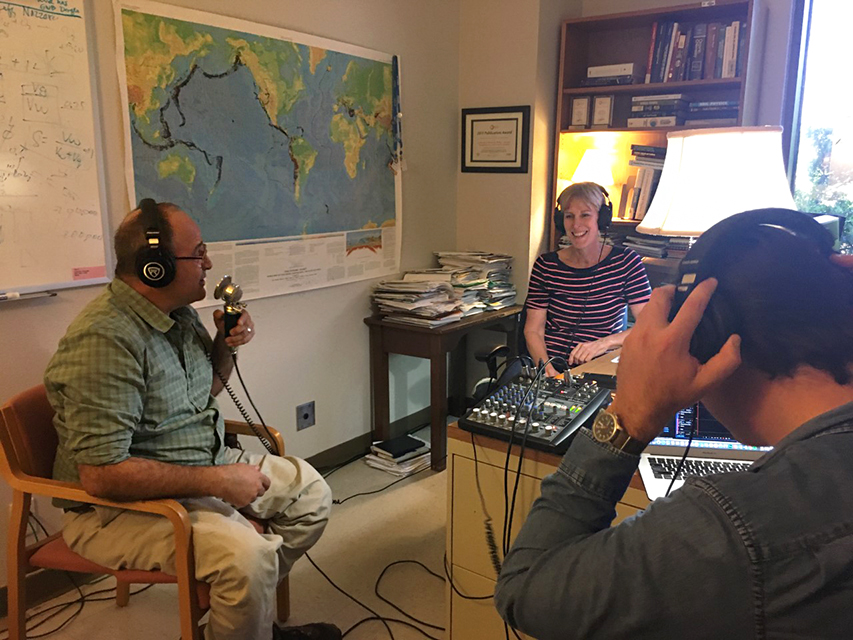
Listen to the podcast episode where Katherine Romanak talks about environmental risk monitoring at carbon capture and storage project sites
April 3, 2019: GCCC post-doc Zhi Zhong presents his research results applying machine learning to geologic carbon sequestration at the GCCC weekly staff meeting.
GCCC post-doc Zhi Zhong demonstrates that machine learning techniques have high accuracy for porosity and permeability estimates and can be applied successfully to reservoir characterization.
April 2, 2019: GCCC research scientists Katherine Romanak and Vanessa Nuñez-López appear in the official GHGT-14 conference highlights video released today by IEAGHG. Romanak introduces and concludes the video, telling of the global importance of the renowned conference, particularly its contribution to carbon capture and storage technology knowledge dissemination. Watch the video here.
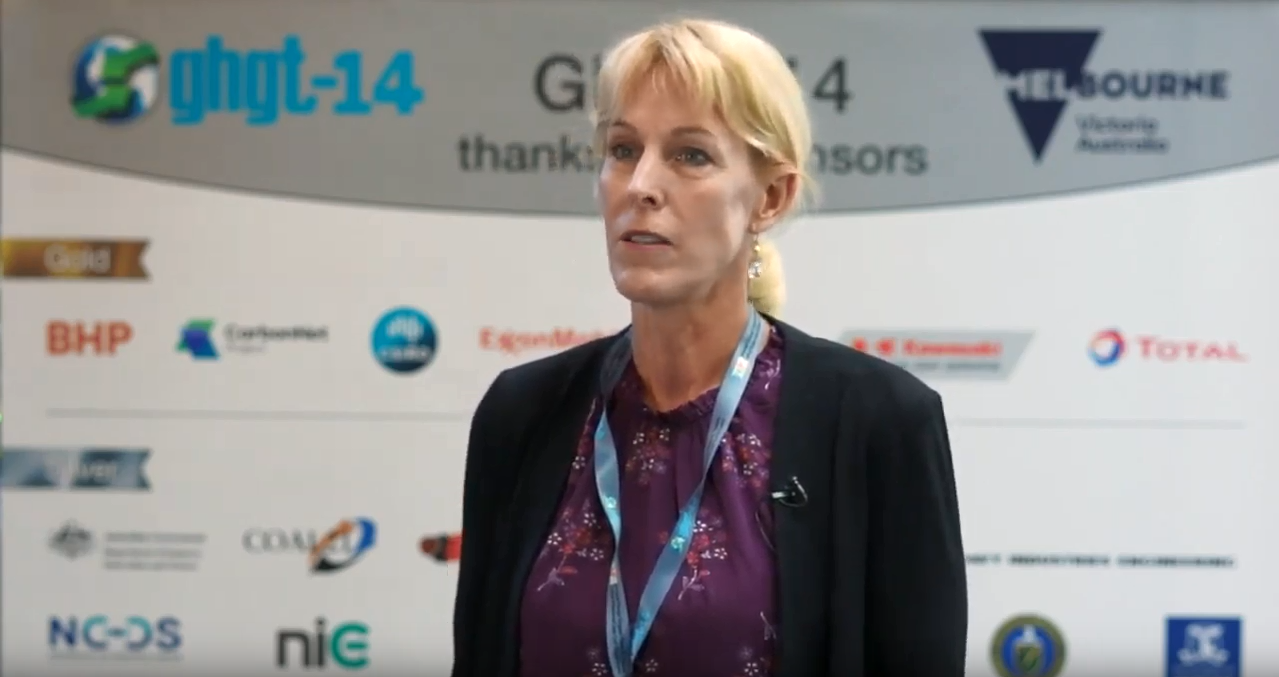
GCCC senior research scientists Katherine Romanak introduces the renowned conference on IEAGHG's GHGT-14 highlights video.
March 27-28, 2019: GCCC principal investigator Susan Hovorka, post-doc Sahar Bakhshian, and master's student Sarah Prentice attended and presented at the Southeast Regional Carbon Sequestration Partnership (SECARB) 14th Annual Stakeholders’ Briefing.
Susan Hovorka presents about the Gulf of Mexico Partnership for Offshore Carbon Storage (GoMCarb) at the Southeast Regional Carbon Sequestration Partnership (SECARB) 14th Annual Stakeholders’ Briefing.
March 20, 2019: GCCC master's student Sarah Prentice gave a talk titled, "CO2-EOR Feasibility in SECARB Region Limited by CH4", at the weekly GCCC staff meeting. The research was done as part of her master's thesis project.
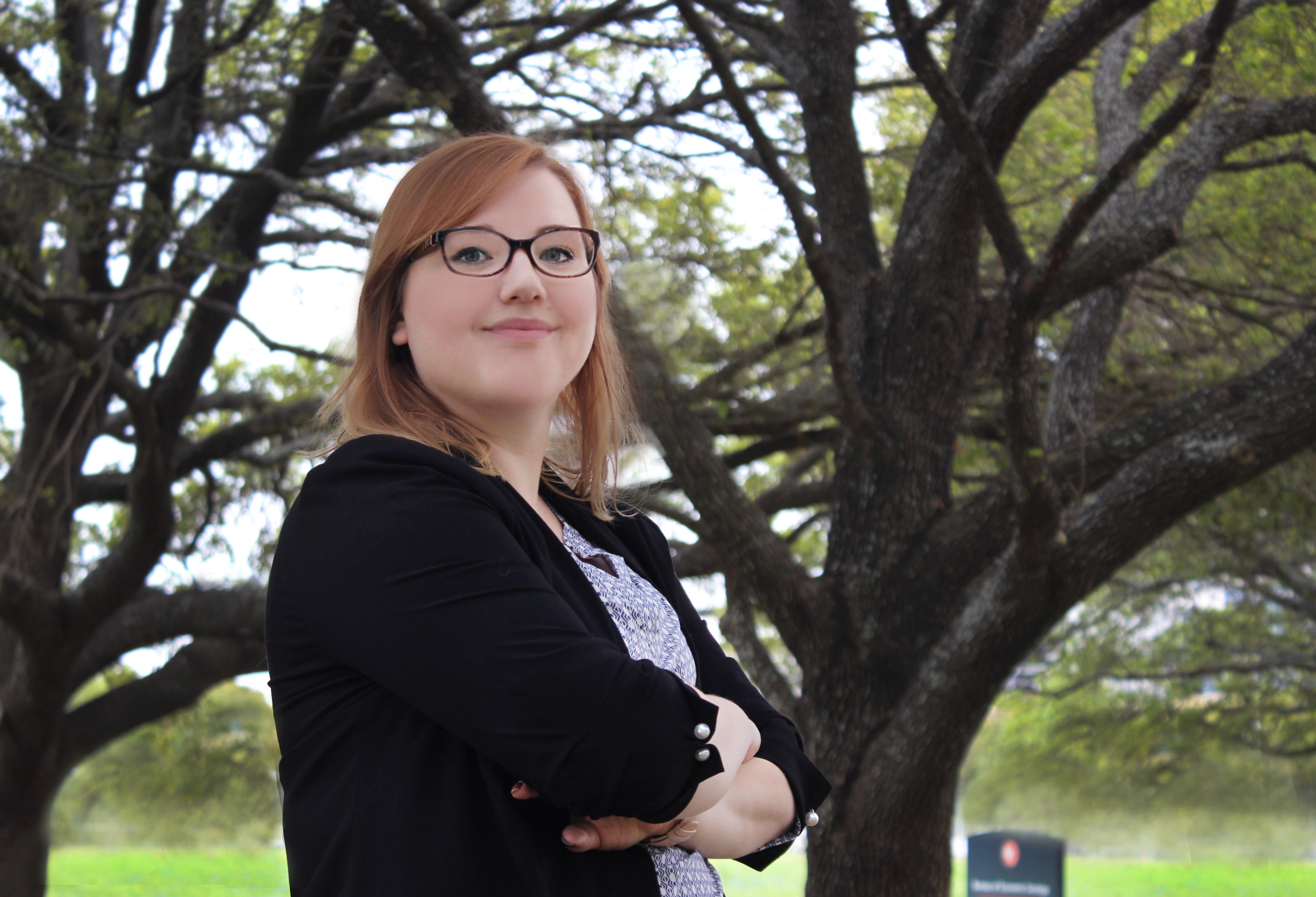
Sarah Prentice is a master's student at the GCCC, studying methane interference during CO2-EOR.
March 19, 2019: Emily Moskal attended the monthly Science Pod, a university-wide meeting for all science department communicators, on the UT Austin main campus. Emily pitched two op-ed stories that originate from GCCC research and expertise and will be working with university media relations over the next month to increase GCCC's technical clout in the public sphere. Several other outlets to spotlight GCCC's research were identified and will be added to the group's overall communication plan.
March 15, 2019: Emily Moskal, GCCC program coordinator, met with Travis Hobbs, a business and policy strategist, to discuss avenues to get the relevant technical information that GCCC generates in front of the right policymaker stakeholders that may need it and raise the profile of GCCC's senior researchers as technical consultants. Together, a preliminary stakeholder landscape map was generated.
March 6, 2019: Caroline Reck of Glass Half Full Theatre gave a talk about using puppeteering to communicate the difficult topics revolving around climate change. She plans to include CCS in an upcoming show about mitigation strategies and sought technical advice on concepts related to the technology. Staff enjoyed learning about alternative science communication strategies.
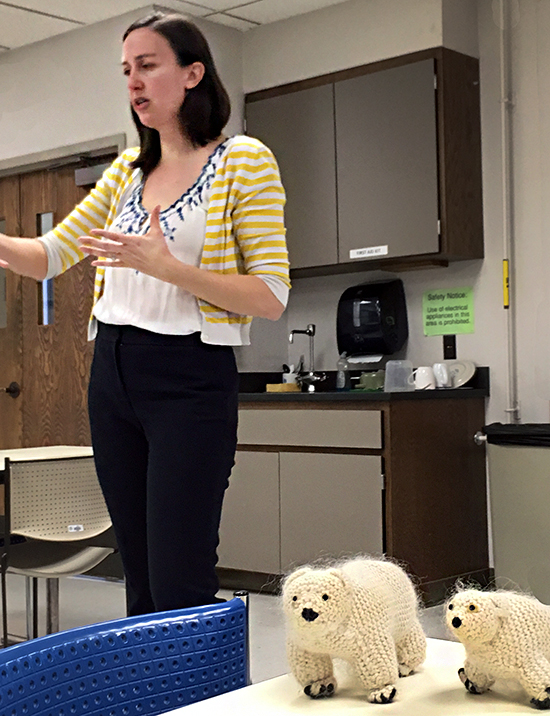
March 4, 2019: GoMCarb advisory committee member Rob Finley mentors two of GCCC's graduate students, offering development and one-on-one training from an industry and academic professional with decades of experience in subsurface geology.
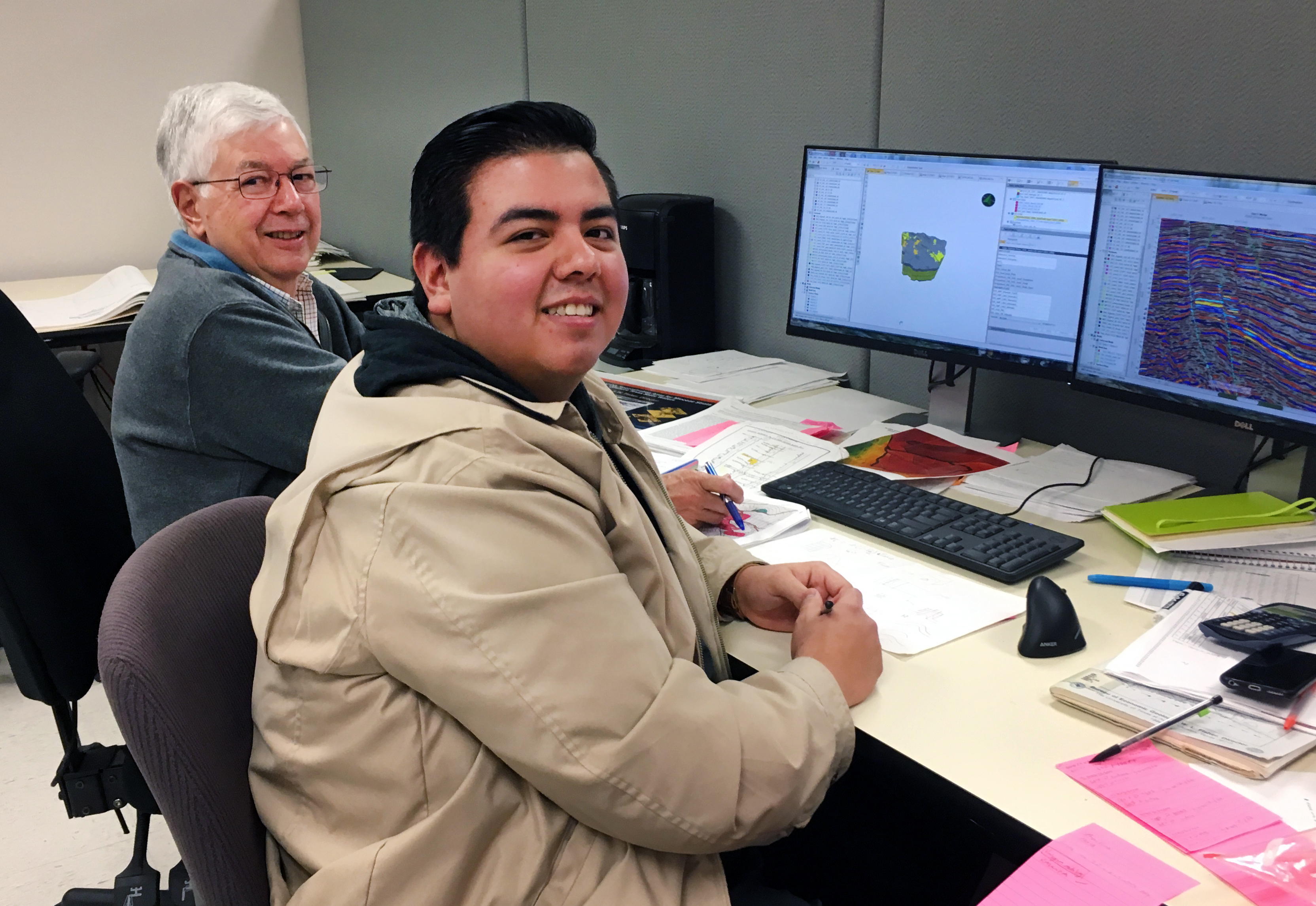
Rob Finley mentors GCCC master's graduate student Izaak Ruiz
March 2, 2019: Several GCCC students and research scientists demonstrated basic concepts behind greenhouse gases, climate change, carbon dioxide gas, and carbon capture and storage using hands-on activities during the university-wide Explore UT event. The GCCC demo, "What to Do with CO2: Cure for the Feverish Earth", was enthusiastically participated in by dozens of groups of K-12 students. You can find the lesson plan here.
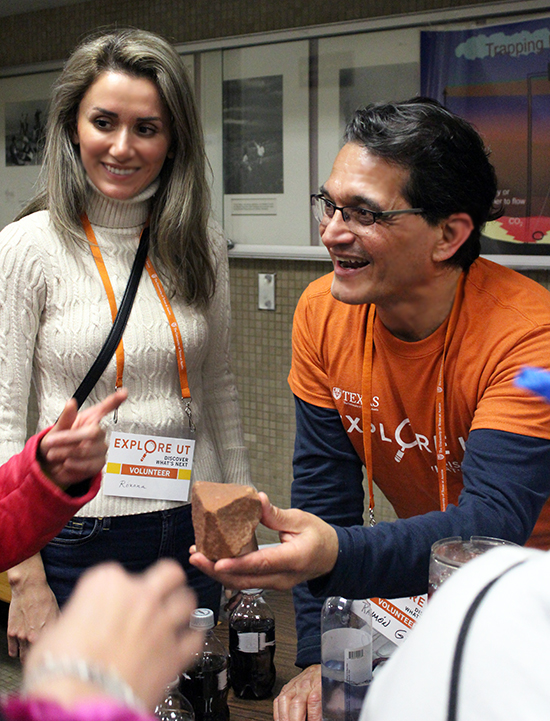
Roxana Darvari and Ramon Gil-Egui present at Explore UT
February 27–March 2, 2019: Katherine Romanak attended the annual STEMM-CCS meeting in Amsterdam. During theStrategies for Environmental Monitoring of Marine Carbon Capture and Storage (STEM-CCS) meeting, more than 50 researchers and experts who work on monitoring carbon capture and storage projects met, networked, and shared knowledge gleaned from various projects around the world to gain increasingly-confident and highly-demonstrated skills to support project safety. Romanak is on the group's stakeholder engagement advisory board and attended with other members including Tim Dixon and Mark Chapman.
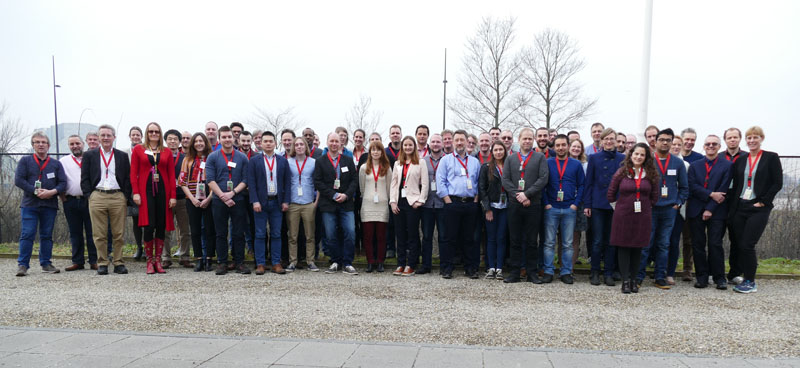
The STEMM-CCS group outside the Shell Technology Centre, Amsterdam (image courtesy Kelvin Boot). Read STEMM-CCS's blog post about the meeting.
February 25–26, 2019: Tip Meckel traveled to Oslo, Norway to attend the CLIMIT Summit. The Summit is administered by a collaboration between the U.S. Department of Energy and Norway's Ministry of Petroleum and Energy. The summit offers researchers and other technology developers to meet and discuss progress and potential areas for further collaboration in four main areas: large-scale testing of carbon capture technologies, CO2 storage and MVA, CO2-EOR, and crosscutting research programs that explore one or more of the formerly stated programs. Tip presented "Global Perspectives on Offshore Storage" and engaged in fruitful discussions with other CCS researchers, bringing back the latest knowledge from global projects to share with other GCCC researchers.
February 25, 2019: Susan Hovorka was interviewed about offshore subsea CO2 storage in a podcast released today, titled "Carbon Sequestration with Dr. Susan Hovorka" produced by the American Shoreline Podcast Network.
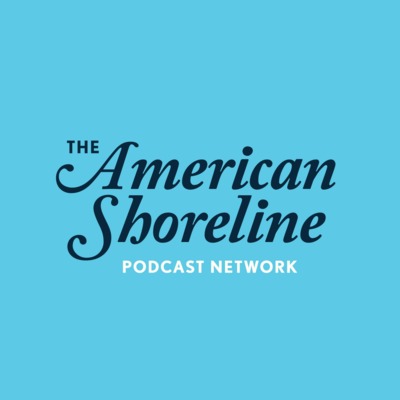
February 25, 2019: Susan Hovorka taught "Too Much of a Good Thing" to 40 Texas high school teachers as part of the OnRamps dual enrollment high school day of professional learning. If you're a K-12 educator, download a lesson plan here.
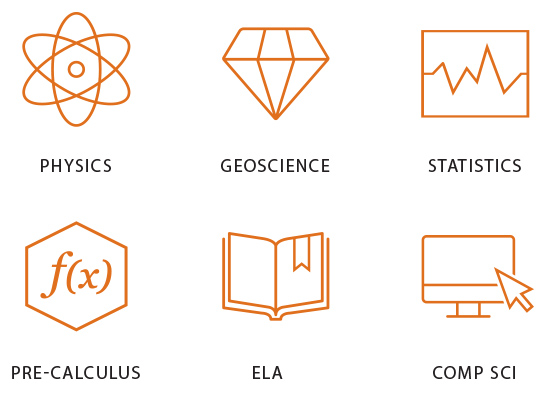
February 22, 2019: GCCC post-doc Baole Wen gave a seminar at the Institute for Geophysics at UT Austin. His talk, titled "Modeling of convective CO2 dissolution in a closed porous media system: from low-pressure ideal gas to high-pressure real-gas conditions", explores the use of mathematical models to capture the behavior of convective CO2 dissolution in closed reservoirs. This work was funded by CFSES. Watch the talk here.
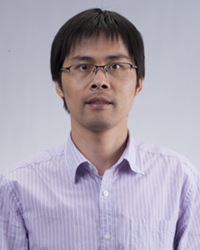
Watch Baole Wen's presentation titled, "Modeling of convective CO2 dissolution in a closed porous media system: from low-pressure ideal gas to high-pressure real-gas conditions"
February 22, 2019: Tip Meckel gave a talk titled, "High-Resolution 3D Marine Seismic Monitoring Above an Active CO2 Injection Site, Offshore Hokkaido, Japan", as part of the Bureau of Economic Geology's Friday seminar series. His talk covers the novel use of HR3D as a characterization and monitoring tool for large-demonstration and commercial-scale offshore carbon capture and storage (CCS) sites. Watch the talk here.
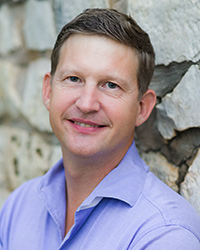
Watch Tip Meckel's presentation titled, "High-Resolution 3D Marine Seismic Monitoring Above an Active CO2 Injection Site, Offshore Hokkaido, Japan"
February 19, 2019: Emily Moskal and Susan Hovorka attended a meeting of the Texas Chapter of the American Shore & Beach Preservation Association in Austin to learn more about diverse groups working on the Texas coast.
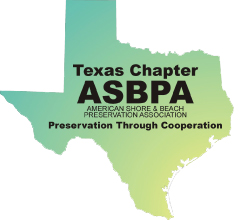
Feb 15, 2019: Tim Dixon, GoMCarb advisory committee chair and program manager at IEA Greenhouse Gas, gave a talk titled, "Update on the Role of CCUS in the Global Climate Scene," as part of the Bureau of Economic Geology's Friday seminar series. Watch it here.
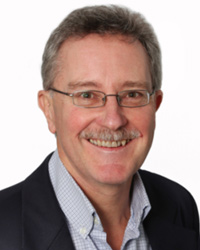
Watch Tim Dixon's presentation titled, "Update on the Role of CCUS in the Global Climate Scene"
February 11-12, 2019: More than 60 carbon capture and storage (CSS) experts, including GCCC researchers, met in Beaumont, Texas to attend the annual meeting of GoMCarb and SECARB Offshore project partnerships which covers project progress and the latest findings of the first two DOE-funded projects looking into offshore CCS. This year's meeting was hosted at Lamar University in collaboration with GCCC. Read the meeting report here.
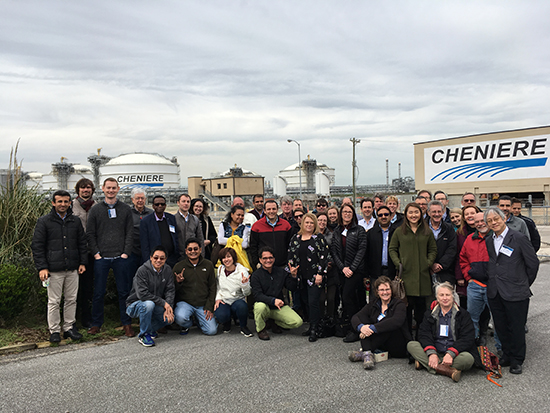
A large group of researchers met in Beaumont, Texas to attend the first annual meeting of offshore CCS DOE partnerships which was hosted by our collaborators at Lamar University. Many also attended a field trip to the nearby Cheniere LNG facility.
February 5, 2019: Vanessa Nunez-Lopez presented on a panel at UT Energy Week 2019. The panel, “Clean, Green or In-between: Competing visions of a decarbonized economy", discussed which energy technologies are vital to meet the climate mitigation paths laid out in the latest IPCC report as well as the opportunities and challenges associated with rapidly scaling up emerging technologies such as battery storage, small modular reactors, and CCS. View slides from her talk here.
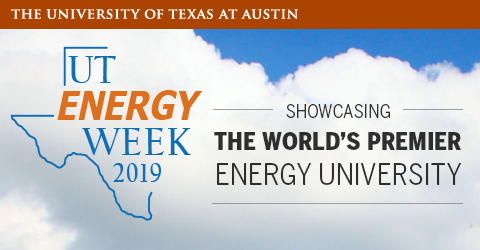
January 16, 2019: Katherine Romanak presented “Risk assessment on CO2 leakage at CO2 storage sites" at the CCS Technical Workshop in Tokyo, Japan. The workshop focused on risk assessments for geological CO2 storage. Other international speakers included Tim Dixon of IEAGHG, who spoke on the current state of international legislation and regulation on CCS, Josh White of Lawrence Livermore National Laboratory who spoke about the progress and challenges of risk management at CCS sites, and Bettina Goertz-Allman from NORSAR who spoke on developments in microseismic monitoring and risk assessment of large-scale CO2 storage. The workshop was organized by the Geological Carbon Dioxide Storage Technology Research Association at the Research Institute of Innovative Technology for the Earth (RITE) in collaboration with the Ministry of Economy, Trade and Industry (METI) and New Energy and Industrial Technology Development Organization (NEDO). There were over 300 attendees to the workshop.
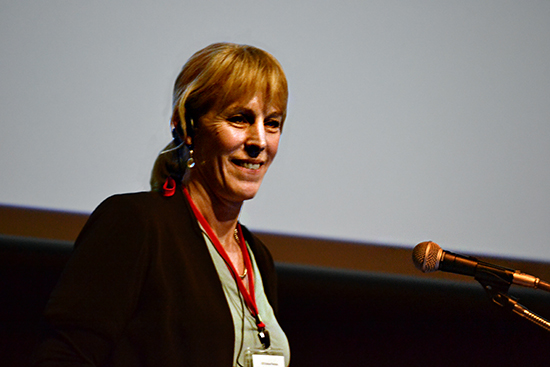
Katherine Romanak gave a talk in Tokyo, Japan about assessing risk at CO2 storage sites.
January 3, 2019: Susan Hovorka presented “What To Do With CO2” to the Texas Environmental Education Advisory Committee (TEEAC) during their field day visit to the Bureau of Economic Geology. Feedback was extremely positive from organizational representatives of the Witte Museum, San Antonio and Forth Worth Zoos, LCRA, TEA, TPWD, Westcave Preserve, and several other organizations offering educational programming.
-750px.jpg)
Susan Hovorka demonstrates CO2 capture and storage concepts to K-12 educators using classroom-friendly materials.

